#that was just like. very inaccurate to create some kind of narrative that i just remember weirded me out n i just kind of ignored it
Text
cursed w the combo of loving nature and mystical ideas and charming language etc whilst also being like a massive snowflake killjoy hater bc at least once a day ill experience a moment of “🧐😐🤨 > aw what a cute sentiment though maybe im just being a killjoy > 🧐😐🤨🧐😐🤨🧐😐🤨”
#90% of the time when sm1 tries to talk abt evolution in a way thats um. loose with the facts in order to say someething romantic#like nope im shutting this shit down sorry#i dont even rmbr what the specific thign was#but i rmbr a while ago when everyone was sharing this twt thread about the evolution of some creature or something#that was just like. very inaccurate to create some kind of narrative that i just remember weirded me out n i just kind of ignored it#n then the twt op turned out to be like a straight up fascist#and tumblrinas were just like awww cute creature<33#and that one article abt how david attenborough creates narratives and the wider implications of that#not to be like a massive autist and snowflake but im almost approaching a position where im just like#inherently uncomfortable with selectively presenting/shaping natural science in order to construct a deliberate (anthropomorphised) narrativ
3 notes
·
View notes
Text
I think that one of the reasons why people misinterpret Wylan's character and arc, among others, is because they misinterpret the relationship between him and Kaz. This post has kind of mitosised off from the BFWP (Big Fucking Wylan Post) I'm writing because it's a bit of a different focus and constitutes its own post.
A lot of people talk about Wylan's character and development as though it's meant to match Kaz's - starting out as a nice kid who the city forces to become amoral, indifferent to violence, and well-versed in crime. These qualities are usually talked about with a weird reverence as an irrefutable symbol of "badassery", as though it's always a positive development for any character regardless of the story's narrative, which annoys me but is not the topic of this post. That's part of the BFWP's job.
Following Kaz's exact development is not the point of Wylan's character. The point is that Kaz and Wylan narrative foils - very similar in many ways, but with a fundamental difference that creates the "broken mirror" effect/shows how they could have turned out if they'd chosen differently. I think that difference is how they respond when they climb out of the harbor after their respective betrayals. Narratively, Ketterdam represents a very harsh system that presents the people struggling there with very few options. You can either choose to ditch decency, play by the Barrel's rules, and live, or you can hold on to decency and die.
When Kaz returns to the streets after Jordie's death, he chooses the first option. He copes with what happened through ideas of revenge, and to survive long enough to see it he quickly turns to thievery and violence. He thinks to himself after he robs a kid for money and food that it was much easier to survive when you've left decency behind. He survived through violence, creating the Dirtyhands persona around himself for protection.
When Wylan has to fend for himself, he choses the second option. He finds "honest work" at the tannery, where they exploit workers and expose them to toxins. He wonders if he'll live long enough to use his savings to leave the city, or if the chemicals would kill him first. He was smart enough to steal and survive, but he chose decency, and with it, he chose death. There are a number of reasons why he chose differently than Kaz despite their similarities - his older age and thus more developed moral code, having no one to avenge but himself when he believed himself worthless, his more privileged upbringing, and his relatively low drive to live. Alone, he would have died.
Then Kaz steps in. Kaz's role in all the crow's lives is that, intentionally or not, his ruthless rule of the Barrel creates a sort of haven that allows them to survive where they would have died had they stayed alone. Wylan is a really clear example of this, and though Kaz's intentions were at least partly self-serving, his involvement both kept Wylan from dying of exposure or street violence as well as prevented him from needing to do the more terrible things that it takes to survive in the Barrel. Throughout the books, we see Kaz kind of taking the brunt of enacting violence in Wylan's place - traumatizing Smeet's daughter, killing the clerk on the lighthouse. Wylan could get by making explosives in the workshop rather than having to shoot or stab or beat the life out of people. And at the end of the series, Kaz sees to it that he never will have to. Of course Wylan did bad stuff to survive when working with the Dregs, it's the Barrel. But the extent is greatly lessened because of Kaz's involvement.
Wylan's arc was never about becoming comfortable with violence, or becoming just like Kaz - the way people characterize him as some sort of ruthless murder mastermind is inaccurate and redundant with Kaz's character. He isn't nonchalant or celebratory about crime or death or violence by the end of the book. He doesn't HAVE to become like Kaz, because Kaz himself gave him the space to continue being decent, intentionally or otherwise. Understanding that dynamic is important to understanding what Wylan is like as a character and as a person. If you assume Wylan's trajectory is to become "Kaz 2.0", then you're going to mischaracterize him. I've seen posts about how Kaz was the Jordie that he didn't have to Wylan, and I think that makes a lot more sense. Because Kaz is willing to do the horrible things in his stead, Wylan has the third option otherwise impossible in the Barrel - maintaining his decency and surviving.
#Kaz really do expose ppl to the horrors of the world but simultaneously protect ppl from losing themselves to it#sorry guys. wylan likes math and puzzles and his friends he does not like crime. crime is an unfortunate byproduct of surviving#'we could wake them up' Mark my words you stupid quote i'm coming for YOU this week#does this make sense. does this post Sense???#wylan nearly blows his cover just thinking about a terrible guy kaz killed in front of him. THIS is your ruthless killer?? lol#one thing about me. i like characters with Hope and Gumption. thank you wylan sixofcrows#wylan is a bitch but only when standing up for what he thinks is right. especially against kaz. GUMPTION. the GALL.#glad you didn't bite it in the cancer factory you funky little genius#this pairs nicely with my jesper analysis. he enacted violence but unlike wylan he Refuses to Think About It#wylan van eck#kaz brekker#six of crows#soc#tgt#soc meta#soc analysis#bfwp#crooked kingdom spoilers
280 notes
·
View notes
Text
As someone who hasn't read any of the Dune books and knew virtually nothing about the nature of the world the story takes place in before watching the Villeneuve films, the particularities of this distant distant future that Frank Herbert created are kind of blowing my mind. (Please correct me if any of my comments below are inaccurate)
This is a sci-fi world in space with no aliens and no computers. Instead, some of the humans have become alien-like or computer-like--by harnessing the powers of the human mind and enhancing them with Spice. The biopunk angle + providing at least a semi-plausible explanation for the development of superhuman abilities creates a fascinating narrative blend that reads more as mythology than speculative science fiction. Who could come up with a future that feels so ancient?
Maybe I need to rewatch the Villeneuve films again (which I'm planning on doing very soon!!), but I didn't quite catch any of this from watching the films alone. Maybe it's a good thing that Denis and co. didn't try to burden the audience with too much worldbuilding lore, but for me, knowing this context makes the story so much more interesting. I just think the role of technology in the Dune universe is a really important aspect to delve into since it explains a lot of things such as why hand-to-hand combat is so prevalent, why Spice matters so much, etc.
(These thoughts were prompted by this article)
7 notes
·
View notes
Note
Probably because people like Hetalia for the canon characters, not random people's made up ones.
as is true for most fandoms! but i've been in many fan spaces and some are much more supportive of artists and oc creators than others. hetalia fans being unable to engage with fanmade characters isn't a natural conclusion of fandom culture, but is something that comes about due to a lack of appreciation for the love other fans are expressing. smaller fandoms with less content are much more kind and appreciative and genuinely invested in the creations of their fellow fans, and i speculate this comes from a lack of entitlement.
hetalia fans have been kind of spoiled, there are so many amazing, professional artists who have posted over the years, so people get to be very picky. there's less consideration for the artists who are actually making the art. whereas, in smaller fandoms, people are just a lot happier to share the things they love with others.
just because you can't see my oc in the art you may cherry pick, it doesn't mean i'm not present. because the picture wouldn't exist without my love! but people prefer to view fanart the way they view photos. they get lost in their fandom indulgence to the point that they don't appreciate artists, because they favor the narrative that the pictures they see are windows into some world that exists solely for them to consume.
you can pick what art of mine you like and care about and what art you don't, but i'm allowed to be frustrated at the hetalia fandom's inability to care about me as an individual. pretending that's just the way things are is inaccurate, because once again, not all fandom spaces are like this.
i know i personally adore fanmade characters because it makes me happy to see others expressing their love in such a personal way. i don't see other fans as "random people," and i care about the things that make them happy. this outlook varies from individual to individual, so speaking like this is normal behavior is a disingenuous, but convenient excuse. no matter what you believe about the reasoning, there are plenty of people who don't think that way.
there's also a specifically western fandom issue of being incapable of viewing "anime artists" as people, so in anime fandoms like this one, you see a lot less respect for artists as a whole (racism plays into the foundation of it even if it isn't always an implement of its execution.) in a fandom with a history of art stealing, editing, and reposting with scant credit, of course you're going to have a culture that doesn't value the people creating fan content in the first place.
maybe, just maybe, hetalia fans have an entitlement problem. i would posit they do!
#extra long reply because this has been on my mind and i've debated talking about it#thanks for the excuse to babble
5 notes
·
View notes
Note
For the ask game from like. 3 days ago: Wat from The Eclipse? 👀
omg wat!!!! I honestly haven't engaged with this character a TON so forgive me if any of these are canon-inaccurate - but i do find him to be a loveable and intriguing little guy!
sexuality headcanon: ok this one is interesting. i don't think we see a ton of romantic or sexual intrigue for wat at all in the show. in fact, i would say it's narratively noticeable how detached he is from the romance going on. of the 5 kid main characters, he's the only one without a love interest (hell, even dika and chadok are in love). what's more, wat's character is a filmmaker...he stays behind the camera, making stories of others' romance, never experiencing his own - and he seems to be pretty happy in that position. this could dovetail nicely with an aro headcanon, although it doesn't have to.
otp: none in particular. he's just a little guy...idk i can't really imagine him with anyone
brotp: kan + akk... i wish the show spent more time on their friendship and how it changed over the course of the series! it's quite rich, because wat is usually the first one to entertain a point that's contrary to the status quo they're supporting, which creates some tension, especially with akk.
notp: TEACHER SANI!!! i was so afraid the writers were gonna make something uncomfortable go down between them. i'm glad they didn't take it there, but i still think it was a little weird how involved she was in their personal lives LOL (why was she at the movie showing at akk's literal house eye-)
first headcanon that pops into my head: wat 100% has an older sister
favorite line from this character: "An act! This is all an act!" because he did canonically save akk from being outed but also who the fuck would believe this....it was just very silly but also very earnest and kind

7. one way in which I relate to this character: being the one to go against the flow in a discussion with a team/friend group
8. thing that gives me second hand embarrassment about this character: see #6...
9. cinnamon roll or problematic fave: cinnamon roll. i could never be mad at this guy
thank you so much for the ask beloved, this was fun to do!!!!
10 notes
·
View notes
Text
I am... very tempted to start creating a website of some sort for Zeta Gear. The idea of doing something like that has more downsides than upsides (the most prevalent one being The Mortifying Ordeal Of Being Seen In Any Measure) because it's such a personal project on so many levels, but I feel like if even the smallest number of people showed genuine interest in my creation, it would give me both the courage and the motivation to keep going... As it is now, it's just me, my ideas, and the ever-rising mountain of dread and fear that I will, one day, forget every single story detail and design idea I came up with so far, because human brains are flawed machines.
The rest of this is under a readmore because I'm not a monster. TL;DR in the tags.
I've got tracks. I've got words. One day, I will have proper reference sheets as well. But even a gargantuan task such as figuring out what shape this story is supposed to take (a written work? a comic series? animation (god FORBID)? hypertext fiction a là 17776 or DECT?) pales in comparison to that of getting people to consume the source material, which is vital to one's understanding of the importance of having all these different characters together in one place, because it's not just a random mishmash of familiar faces with some resurrected people thrown in there for the hell of it, it's a sincere effort to give these characters a fulfilling ending (because fuck GOTP) or at least one that doesn't feel hollow and bleak and so devoid of hope for joy of any kind you have to look for solace in the events that take place in the greater narrative, which, surprise, are equally as bleak and only faintly hopeful, if even that. (Or it IS hopeful, but then, come another game, all of it's gone down the drain.) Shit, sometimes I feel like Dark Souls has more bright moments in it than Metal Gear does. Crappy and inaccurate and overexaggerating comparison, I know, and I am sorry, and I know that pain is the quintessential part of each and every MG game out there (yes, even Revengeance, but we go to Revengeance for party rocking, not the feels), but please consider - sometimes, some things, small as they might be, don't have to end up that way, and just as the accumulation of small sufferings gets people accustomed to adulthood, the accumulation of small joys in life might lead to a happier, more hopeful ending for everyone involved.
#zeta gear tag#i might add more onto this#but the main takeaway here is that fuck it. shoot if you want me to talk you into playing an entire game series and then blast you with my#goddamn halo au about it.
1 note
·
View note
Note
Why do you think so many dramas are obsessed with the Qianlong era?
Very very good question, thank you for asking. This turned into sort of a rant but I’ve been wanting to say these things for a long time. I don't know how well known this trope is outside China but there is the idea of 康雍乾盛世, or the "Golden Age of Kangxi-Yongzheng-Qianlong" in Chinese history discourse, which glorifies the second half of the 17th and the whole of the 18th century as this super powerful and amazing time period within the Qing. Emperor Qianlong himself has somewhat of a cult of personality and is a popular figure in historical fiction, especially the bogus and disreputable kind involving romances (野史). His status as the monarch made it easy to write dramas set in the court, which is a perfect fit for the 清宫剧 or Qing court/harem drama genre popularized in the late 1940s. Actually, thinking about it Marvelous Women is one of the only famous Qianlong era dramas that are set outside of court, that's commendable (but then its inaccuracy makes it a lamentable missed opportunity). Actually maybe there are more out there but the inaccurate costuming makes it very difficult to address them as Qianlong era. In the 2000s and early 2010s there were multiple Qing court dramas set in the 17th and 18th centuries, so they have developed into a familiar television cliche and even a cinematic universe of sorts. It’s kind of similar to how a lot of European period dramas are obsessed with Marie Antoinette? Once you make a couple dramas about the same person/group it just keeps going.
On the contrary, the 19th century is known as the "century of humiliation" in China because of Western imperialism, and the Qing court in the 19th century has always been depicted as barbaric and backward in the colonial, Orientalist narratives touted by both actual Western imperialists and Chinese nationalists who internalized their views, so most people don't feel comfortable romanticizing the 19th century court. Personally I am not burdened with this whole shame baggage because I think the Qing was not at fault for being colonized at all, it was the colonizers’ fault, if anything. We do not victim blame in this house. Also, there is plenty of photographic evidence for 19th century China, so in a way it doesn't feel distant enough to sustain a fantasy. Most dramas set in the 19th century court are so called 正剧 or "serious dramas" about political intrigues and grand nationalist undertakings, which are supposed to be more realistic (though I feel like they’re only considered serious because they have a male target audience...)
Sorry got a bit carried away here. Going back to the popularity of the Qianlong era, "Golden Age of Kangxi-Yongzheng-Qianlong" is a concept that irritates me to no end. The assignment of golden ages arbitrarily creates some periods that become overrepresented and some underappreciated, and marginalizes transitional periods where potentially important changes take place. Oftentimes when I see people’s reactions to beautiful artifacts or art from conventionally “weak” time periods, how they act all surprised and say something like “wow I did not expect such nice things to come from this time period” I can’t help but roll my eyes. Life will always be difficult for some people and enjoyable for others regardless of time period, in order to write a story the perspective has to be cherrypicked anyway, so why bother shying away from conventionally “weak” or “unstable” periods. This is not to mention how the criteria for choosing a golden age often reinforce structures of power and bigotry; “golden ages” in Chinese history were usually times when the military was strong and society was conservative, when China was invading other countries left and right and subjugating other peoples. It’s so uncomfortably male centered and overly nationalistic, and plain immature...
And as we can see in the miserable level of accuracy in dramas set in the Qianlong era (or any other popular era to be honest), this obsession is nothing more than 叶公好龙, an obsession with the idea of something and not its content. Most producers don't actually give two hot fucks about real fashion in the Qianlong era, just ways in which they can use it as a backdrop for a fantasy. Despite the wealth of dramas and other media set in the Qianlong era, I have never seen a single Han women’s costume that is actually based on real sources from the Qianlong era (though I have seen some in Song of Youth, which is... set in the Ming Dynasty).
The second half of the 18th century is a non era in Chinese fashion history, a void with next to zero recognition and a public ready to either deny its complete existence or appropriate it as the late Ming. Personal anecdote: I was once visiting the Museum of Applied Arts in Vienna with a friend and there was this wallpaper from the Qianlong era with human figures in realistic fashion on display. This friend was quite interested in historical fashion so I pointed out to her that those clothes were Qianlong era (it also said that in the description of the artwork), and she straight out fucking refused to believe that and insisted they were from the “very early Qing”. This is not at all her personal opinion but a very widespread mindset in Chinese history discourse. I guess this goes back to the misconception of “late Ming fashion continuing into the early Qing” and all Qing fashion that do not look like stereotypical 19th century clothing getting mislabelled as Ming instead. It is incredibly frustrating. This is what I mean when I say 18th century erasure. It is so normalized in the Chinese period costuming industry that it doesn’t even sound weird or wrong to a lot of people, even though it should.
I know many readers of my blog are interested in Western historical fashion as well, so to illustrate how absolutely bonkers 18th century erasure is let me make up some examples. Imagine, there is this new drama set in Georgian Britain, and they use exclusively costumes like this:
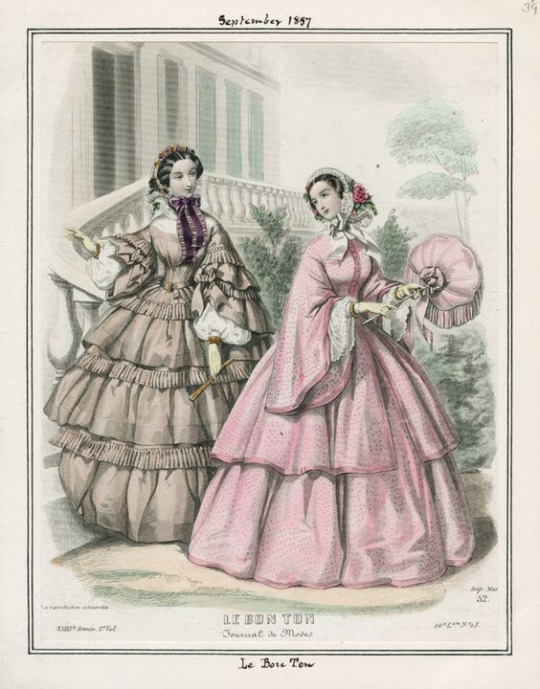
Source
Or like this:
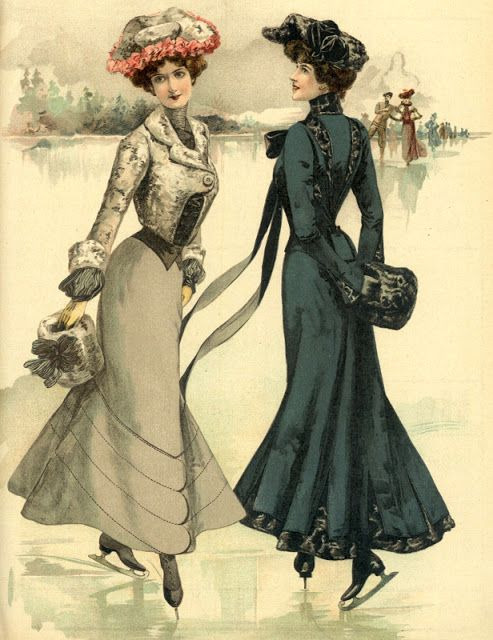
Source
Or even like this!!!
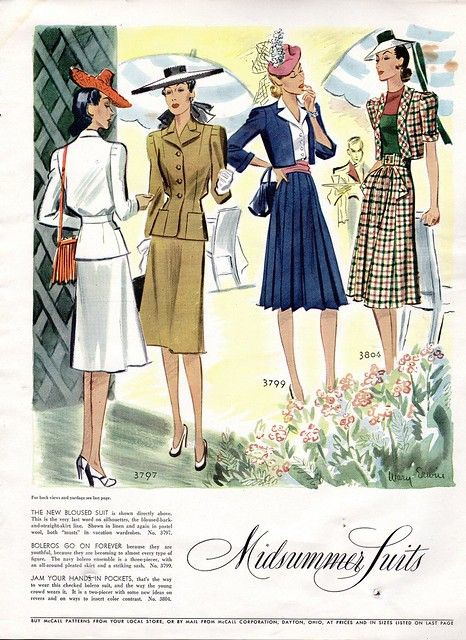
Source
(A lot of Manchu fashion featured in period dramas are legit from the 1940s)
And then you show someone an 18th century fashion plate you found
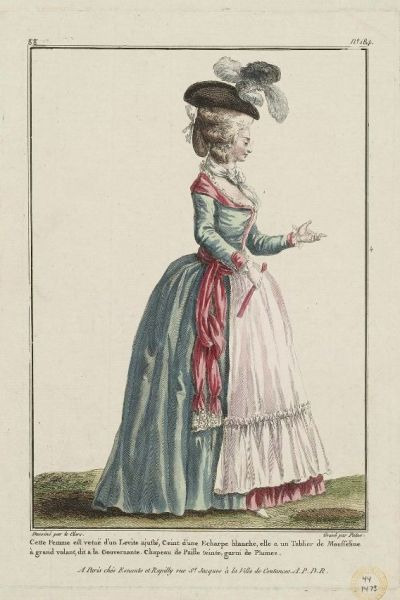
Source
and they say, “oh this looks kind of Tudor, it must be 17th century! In the 18th century people actually wore what is shown in the drama, which is very accurate.” Wouldn’t you want to metaphorically yeet yourself out of the window?? How is this widespread and acceptable??
#qing dynasty#qianlong era#orientalism can eat shit#18th century#18th century erasure#yes this is a new tag now
342 notes
·
View notes
Note
i know you’re not a fan of the citrus anime, but is the manga any good?
short answer: no
long answer:
if you spend any amount of time in the yuri fandom, you will eventually have to contend with Citrus. It’s one of the most popular manga in the genre, so it’s kind of unavoidable. And whenever Citrus comes up, you’ll usually hear from a lot of people telling you not to read it because the core premise of Citrus is two girls, Mei and Yuzu, falling in love shortly after becoming STEP-SISTERS, and the first few chapters involve Mei repeatedly sexually assaulting Yuzu (this actually goes the other way around at one point as well, though that doesn’t exactly make things any better). I am here to tell you that those people are wrong.
Let me explain.
Citrus is an infuriating 10 volume cocktease of a manga. What I mean by this is that reading Citrus, it gives you the impression that it could get really good like any chapter now, and then it just never does. The art is good, the main character, Yuzu, is super compelling and entertaining (and imo I think she’s the reason this manga has such a massive fanbase because she can be a Mood And A Half sometimes), it’s got some pretty strong emotional moments and a lot of good comedy here and there. But this is a situation where the whole is very much less than the sum of its parts. This manga has a lot of elements that are individually satisfying, but they don’t come together into a compelling narrative. I think there are two big overarching reasons why.
1) Citrus does not create and resolve conflicts in a satisfying way
A romance manga like Citrus is very much about the journey, not the destination. You know Mei and Yuzu are going to get together, it’s just a matter of how they get together and what sort of obstacles keep that from happening until the very end. This is why so many romance manga rely on tsundere/enemies-to-lovers scenarios. The harder it is for the characters to admit their true feelings for each other, the more you can stretch out the narrative and the more chapters of manga you can get out of it. A good example of this in the yuri world is Bloom into You, where the main characters have done so many mental gymnastics to convince themselves they either can’t love or can’t be loved that as the audience you’re like “shit, I know these two are gonna get together eventually but how the fuck are they gonna get out from this nonsense?”
Citrus has no goddamn idea how to do this.
A huge chunk of the first four volumes is spent introducing side characters who appear to be potential romantic rivals for either Mei or Yuzu. These characters can be pretty entertaining in their own right, but all the dramatic tension around them falls consistently flat. The solution to every problem presented by these rivals is just talking to whichever girl they were interested in, because said girl (either Mei or Yuzu) was never interested in the rival to begin with. These arcs feel unsatisfying because the way the problem is resolved would suggest, on some level, that these were never problems in the first place. All of this could have been avoided if the characters had just talked to each other.
And this same problem rears its head near the end of the series as well, the worst example being the ending. Mei separates from Yuzu suddenly and in dramatic fashion because her grandfather is forcing her into what is essentially an arranged marriage. The chapter where we learn about this is legitimately emotionally affecting, with the slow build-up to Yuzu learning that Mei never wants to see her again. It gets you in a way that nothing else in this series really does. But then the solution to all of this is just Yuzu proposing to Mei? And the whole family just goes along with this?? Despite them being step sisters???? Like you’d think the problem here is that Mei’s grandfather is very traditional and conservative. Like he doesn’t just want her to get married before she took over the academy, he wants her to marry a specific person from a rich family that he chose. But no, apparently the step sister marriage is a-ok! which means the only real problem here is that Mei didn’t tell Yuzu about any of this shit until it was already in motion, which brings us to the second core issue:
2) Mei does not change or improve
Mei causes a huge percentage of the conflict in this series. And not only does she cause it, she causes it in exactly the same way over and over again. Mei’s big, defining character flaw is that she’s emotionally distant and bad at communicating. Because of this, Mei repeatedly conceals information from Yuzu for, at least as far as the audience can tell, no discernible reason, creating conflict that never needed to be there. This takes the form of the previously mentioned final chapters, the first volume or so where Mei forces herself onto Yuzu rather than just telling her how she feels, that whole nonsense with Sara, and so, so much more. Citrus runs on the logic of a corny 90s sitcom. Every problem is based on a misunderstanding or a miscommunication, so everything can be resolved if the characters just fucking talked to each other. This sort of storytelling can work if you’re writing a farce (like every other Shakespeare comedy was based on a case of mistaken identity) but in a drama it’s fucking infuriating.
It would be one thing if there was an arc where the core problem was that Mei doesn’t know how to communicate, and at the end of that arc, she realizes what the problem is and spends the rest of the series actively trying to improve. That would be fine. But instead, no matter how many times Mei is shown that failing to talk to her step-sister/gf causes nothing but trouble, she just... keeps doing it, either because Saburouta thinks that’s such an important element of her character that it’s not possible to change it, or because it’s a cheap and easy way to add conflict to a relationship where none would exist otherwise.
I think the final straw for me was when I tried reading Citrus+, which takes place after Yuzu’s proposal in the final chapter of Citrus. Within the first volume, Mei goes right back to her old tricks of being moody and evasive and leaving Yuzu to guess at what might be wrong. THESE TWO ARE FUCKING ENGAGED TO BE MARRIED, BUT THEIR RELATIONSHIP HAS BEEN STUCK IN THE SAME PLACE SINCE VOLUME 5 BECAUSE MEI CAN’T IMPROVE! At some point, it starts to feel like that line about the definition of insanity from Far Cry 3. You’re just doing the same shit over and over again expecting different results.
So to put it bluntly, it would be inaccurate to say that you shouldn’t read Citrus because it’s about a pair of step-sisters taking turns sexually assaulting each other.
You shouldn’t read Citrus because it sucks.
1K notes
·
View notes
Text
What Exactly Gothic Is
(Let me preface with trigger warnings, because Gothic makes a point of delving into dark themes: murder, abuse, racism, homophobia, incest, ableism, misogyny)
I have seen certain posts about what the definite characteristics of gothic fiction are that, I hate to say...felt either incomplete or inaccurate. And that has bothered me enough to make my own post about, at the very least, my understanding of this genre.
Some things to get out of the way:
Gothic does not have one fixed definition. It is fluid and nebulous, and while all literature reflects its society, genre changes massively depending on where it was written. Canadian Gothic is not Welsh Gothic is not American Gothic. Victorian Gothic is not contemporary Gothic is not Regency Gothic. Nineteenth century British gothic is often in response to the drastic technological changes of the industrial revolution. Welsh Gothic has a lot of focus on the disenfranchised and the coal mining industry. Where and when your WIP is, and where and when YOU are writing it, is going to define it.
We cannot talk about Gothic as a genre without talking about the racism that much of it is rooted in. We cannot ignore Charlotte Bronte’s dehumanising description of Bertha Rochester, a creole woman. We cannot ignore that Edward Hyde’s physical description is less ‘white’ than Henry Jekyll’s. We cannot ignore Heathcliff’s identity as a racially ambiguous villain. We cannot ignore just how bigoted in every way Dracula is. We CANNOT ignore the whiteness of much of the ‘feminist’ gothic literature, either. This is something you must be aware of if you're writing Gothic - it is not integral to gothic fiction but as I will explain, the traits of the genre lend themselves to antagonising marginalised groups.
Gothic is not just gothic horror. It can be horror, but it is still a genre in its own right and the horror is not mandatory.
This post is about gothic as a literary genre. I will not be talking about Ostrogoths, Visigoths, gothic architecture or art, and - for once - I’m not talking about the Goth subculture either, the two actually have almost nothing in common.
Some frequent, though not all required, characteristics of the gothic (this is NOT a checklist. I cannot stress that this is a genre purposefully WITHOUT a clear definition):
Familial trauma - the ending of family lines (the presence of the aristocracy is common in Gothic, this trope perhaps most blatantly depicted in Edgar Allan Poe’s The Fall of the House of Usher), hauntings - not necessarily literal but metaphorical. There’s often a secret, or some kind of terrible incident that has been covered up, amongst a family that is inevitably unearthed. Marital trauma is very common - as seen in Jane Eyre with the original ‘madwoman in the attic’, the mystery surrounding the titular character in Rebecca, the secret room of The Bloody Chamber, the murdered husband being literally unearthed in House of America.
The setting is everything in Gothic. It often has a presence enough that it is a character in its own right. Key things about the setting is that it’s typically old - or at least old enough to have a turbulent history - and typically remote, ‘feral’, in amongst nature and separate from civilisation. The latter is very often executed in a racist and/or xenophobic way in Gothic classics. Think very critically of what is considered ‘civilisation’ and what is not. Dracula being a novel about white Christian Britons being threatened by an Eastern European vampire? Don’t replicate that. You will also see the ‘sublime’ (see below) here, and motifs of decay (which can be linked to the ending of a family line easily!), and themes surrounding imprisonment and escape. Gothic fiction loves pathetic fallacy - whether a storm, fog, rain or bitter cold, the weather is absolutely there to set the tone.
Repression. This can be of a trauma, but repression of sexuality can feature too. I have seen it asserted that homoeroticism is a key component in Gothic, and while it can feature, I would not say entirely agree, for a number of reasons. There is often a focus on ‘taboo’ sexuality, a categorisation which places LGBT people with taboos such as incest (which features often in some forms of Gothic). Homophobic tropes such as the predatory gay villain (e.g. Dracula’s obsession with Jonathan Harker and Mrs Danver’s obsession with Rebecca) are fairly common, and a general treatment of homosexuality as immoral or depraved especially older texts, so let’s not act like it’s always been a LGBT friendly genre. Something either hidden away or repressed that is then discovered is a huge, huge, component to most gothic fiction.
Misogynistic gender dynamics are often present: the combination of a young, vulnerable and innocent woman with an older male ‘Byronic Hero’ type love interest is common. The Victorian template of ‘bad’, ‘promiscuous’ or otherwise ‘improper’ woman reaching a sticky end is well loved. And then there’s Poe’s sinister obsession with ‘beautiful dead woman’. Don’t forget the intersection of ableism and misogyny with the ‘mad’ women like Bertha Rochester and Miss Havisham (though Eleanor Vance of The Haunting of Hill House is a sympathetic antidote of this trope.) The way women are written is something I’d very much like us to move beyond.
The sublime: this is everywhere. That something, especially the wilderness, is beautiful and massive enough to be incomprehensible.
Doubles or doppelgangers. Often as a ‘darker’ reflection of the protagonist - such as the hero and villain having close parallels, or the heroine as a foil to her husband’s mysterious dead first wife. It doesn’t have to exist just in this way, but the motif of the doppelganger is one Gothic fiction likes a lot.
‘Otherness’ or monstrosity. ‘Otherness’ and ‘Othering’ is something that is a crucial part of literary theory - what the narrative deems strange, unfamiliar, not like us, and so most depictions of monsters will also be Othered. Considering how almost all of the time in the Western literary canon this is a vehicle for racism, please think critically. Frankenstein’s monster has a more nuanced approach to what society defines as strange, or monstrous, how monstrosity is created, and self fulfilling prophecies.
Cultural anxiety. This is by no means unique to Gothic but the genre is shaped by what the society of its creation is afraid of. This - like Frankenstein or The Strange Case of Dr Jekyll and Mr Hyde - can be scientific advancement and new discoveries we do not yet understand, but the problem arises that for a lot of Western Gothic this has been marginalised groups.
The Uncanny. As found in various forms of horror - same with the fear of the unknown, but often in Gothic - that something resembles something else enough to recognise at least what it ‘tries’ to be, but not enough for it to be truly familiar. This is a really effective way to make any person, place, or thing unsettling.
I think I’ve covered most of my notes - please take my first bullet point into consideration as this will inevitably be a bit UK centric. The thing about gothic is that it doesn’t really have one fixed meaning, so you have a lot of freedom. Bonus: if you want to read a really good gay feminist Gothic short story, ‘The Resident’ by Carmen Maria Machado is one of the best pieces of fiction, ever.
182 notes
·
View notes
Note
Hi Dev. Pardon if I'm imposing. Have you ever seen "Firearms Expert Reacts"? It's a very interesting and educational series of YouTube videos where John Ferguson, the director of the Royal Armories Museum, reacts to video game firearms. He raises curious points that I would love an extended perspective on from an experienced dev like you. The Counter Strike and R6 Seige videos are great ones.
I've seen a number of <Some Expert Reacts To Things In Some Medium> videos about a number of topics, and the general gist is usually the same - real life goals tend to be different than goals in a different medium (narrative, gameplay, etc.), which means that factual accuracy often takes a back seat to the needs of the narrative/gameplay/etc. or even the needs of the schedule. Accuracy mistakes tend to fall into one of two major buckets - either we knew and we did it on purpose because we needed it for gameplay reasons, or we just didn’t know about it. It’s something of a mirror of yesterday’s post about the film Free Guy - our primary goal is to create compelling gameplay, and that can often require us to sacrifice real life accuracy.

In real life, the difference between firearms tends to be the way they are constructed and their firing behavior. The way they kick when fired, the weight, the placement of mass, the size, and so on all affect how a gun handles. In a game, however, we all use the same body and there is no sense of weight. Guns have to function differently or they’re basically just different skins of each other. If we offer a choice of guns, the guns must feel and play distinctly from each other in order to make the choice of weapon meaningful. This necessity often sacrifices real life accuracy like firing rate, grouping, reload speed, ammunition caliber, and so on.

When it comes to the artistic depictions, we’re usually operating off of reference photos rather than being able to examine the actual weapons. Artists are not often experienced with actual firearms and do not have weapon engineering experience, so they often have to guess about what the various small pieces of real-life weaponry do. Reference is often incomplete since we can see what it looks like, but not have any real clear idea how much it weighs, where that weight is distributed, how it behaves in motion, and so on. That just means our artists have to fill in the gaps on the fly and that often results in weird inaccuracies.

Generally speaking, the need of the gameplay we’re making supercedes the need for accuracy. These kinds of issues can be extrapolated for accuracy depicting other topics as well - history, science, culture, sports, and so on. Sometimes we purposely make things inaccurate for the sake of the gameplay experience we want to create. Other times it’s because we just don’t know and we have to guess.
[Join us on Discord] and/or [Support us on Patreon]
The FANTa Project is being rebooted. [What is the FANTa project?]
Got a burning question you want answered?
Short questions: Ask a Game Dev on Twitter
Long questions: Ask a Game Dev on Tumblr
Frequent Questions: The FAQ
31 notes
·
View notes
Note
I am so confused, what is “rep” supposed to be??? Like in the literal sense I know it’s short for the word representation, but I feel like it just gets thrown around a lot?? Like, how is a character exploring his sexuality having dated a woman for years and then breaking up with her to discover himself and explore his interests not “good rep” for exploring sexuality???? What makes something “good rep” or not? Is this like another facet of purity culture or something, where if a character doesn’t meet some arbitrary requirements or whatever they’re “bad rep” and therefore offensive for some reason? This is a really weird mindset if so
I got this way earlier today and am only just now getting around to it so gonna link a few things for context that this is prob in response to [like this] [this] and [this]
I am so totally with you there on that bit where it feels like a lot of people just create arbitrary hoops something needs to go through to count as 'rep' for something.
like... feeling represented is something that's gonna be subjective, not every person is gonna feel represented by a depiction in a piece of media even if they do have traits in common with that depiction, for a variety of reasons.
but that doesn't... negate that other people can feel represented by it, and mean it's somehow automatically bad or worthless or 'doesn't count'
Not personally feeling represented by a specific thing also doesn't negate that showing a depiction of an experience within a narrative is quite literally representing it within that setting, something that's important to do with a variety of experiences if you're trying to tell well-rounded stories that like, reflect the real world and how varied people are.
Now, I definitely think that there are situations where a piece of media tries to represent something and they just go about it in ways that are plain inaccurate, do very little aside from uphold harmful stereotypes, etc, etc, and there's also situations where a piece of media is including a depiction of a type of person/a group and just... frames them in negative and harmful ways/vilifies them/wasn't even trying to give a good portrayal. That sort of stuff I guess what I'd say is in the realm of 'bad rep' but I'd honestly probably phrase it more like 'harmful/inaccurate depictions' when talking about them, ya know?
But a story maybe just not approaching things in the exact way you'd have liked to see it done... saying that 'doesn't count' just feels petty. Maybe it doesn't count to you, but other people can absolutely feel seen and represented by it.
In regards to like the stuff with both Tim and Jon coming out in comics these last few months, even if these things weren't exactly what you wanted or whatever, the symbolic thing of "DC is allowing openly queer characters to be the heroes, not just in mantles nobody's heard of but with titles like Robin and Superman which are household names, and letting them have these kinds of stories about discovery and identity" is still a hugely important form of representation that absolutely 'counts'
20 notes
·
View notes
Text
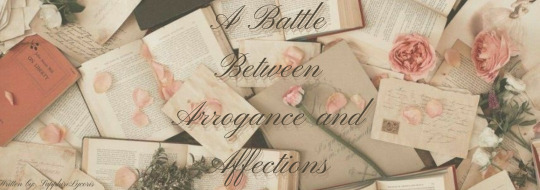
𝑨 𝑩𝒂𝒕𝒕𝒍𝒆 𝑩𝒆𝒕𝒘𝒆𝒆𝒏 𝑨𝒓𝒓𝒐𝒈𝒂𝒏𝒄𝒆 & 𝑨𝒇𝒇𝒆𝒄𝒕𝒊𝒐𝒏𝒔 𝑷𝒂𝒓𝒕: 𝑰
Rating: Teen
Warnings: Suggestive lines, pining (like a lot because Enji's a simp), enemies to lovers style writing, weird 19th century type dialogue but I think it's still readable. Please tell me if I missed any.
Ship: Enji Todoroki x female reader (she/her)
Word count: 2,707
Music: Pride & Prejudice Music & Ambiance
Author's note: I know some of the character's relationships with others are kind of weird but I casted them according to personality. For example, Ryuko reminds me of Charlotte Lucas and Nejire reminds me of her little sister, Maria. I just kind of threw names around haha... A NSFW and continuation soon to come. God, it's been a while since I posted anything on this blog.
Written/created for: @pleasantanathema's Through Ink and Quill | A Classics Collab
Summary: A Pride and Prejudice inspired piece, featuring Enji Todoroki as the male love interest. Loosely following the plot of the actual novel with a few twists on the actual story's dialogue, characters, & events. When you meet Mr. Enji Todoroki, he was the last man in the world you'd ever want to be around. However, as your paths cross more and more, you see that your first impression of him was inaccurate.
"The world works in mysterious ways. He doesn’t know what happened and when it began. Suddenly, Enji cannot stop longing to be in the same room with you. To go one more moment without you seemed like a sin or some unbearable divine punishment for his greatest flaw: pride."

𝑉𝑎𝑛𝑖𝑡𝑦 𝑎𝑛𝑑 𝑝𝑟𝑖𝑑𝑒 𝑎𝑟𝑒 𝑑𝑖𝑓𝑓𝑒𝑟𝑒𝑛𝑡 𝑡𝘩𝑖𝑛𝑔𝑠, 𝑡𝘩𝑜𝑢𝑔𝘩 𝑡𝘩𝑒 𝑤𝑜𝑟𝑑𝑠 𝑎𝑟𝑒 𝑜𝑓𝑡𝑒𝑛 𝑢𝑠𝑒𝑑 𝑠𝑦𝑛𝑜𝑛𝑦𝑚𝑜𝑢𝑠𝑙𝑦. 𝐴 𝑝𝑒𝑟𝑠𝑜𝑛 𝑚𝑎𝑦 𝑏𝑒 𝑝𝑟𝑜𝑢𝑑 𝑤𝑖𝑡𝘩𝑜𝑢𝑡 𝑏𝑒𝑖𝑛𝑔 𝑣𝑎𝑖𝑛. 𝑃𝑟𝑖𝑑𝑒 𝑟𝑒𝑙𝑎𝑡𝑒𝑠 𝑚𝑜𝑟𝑒 𝑡𝑜 𝑜𝑢𝑟 𝑜𝑝𝑖𝑛𝑖𝑜𝑛 𝑜𝑓 𝑜𝑢𝑟𝑠𝑒𝑙𝑣𝑒𝑠; 𝑣𝑎𝑛𝑖𝑡𝑦, 𝑡𝑜 𝑤𝘩𝑎𝑡 𝑤𝑒 𝑤𝑜𝑢𝑙𝑑 𝘩𝑎𝑣𝑒 𝑜𝑡𝘩𝑒𝑟𝑠 𝑡𝘩𝑖𝑛𝑘 𝑜𝑓 𝑢𝑠.
-𝐽𝑎𝑛𝑒 𝐴𝑢𝑠𝑡𝑒𝑛

The world works in mysterious ways. He doesn’t know what happened and when it began. Suddenly, Enji cannot stop longing to be in the same room with you. He dreamed about the sight of your eyes, glancing at him with mild contempt. You occupied his thoughts, both innocent and indecent… He was going to go mad if you didn’t share the same affections that he did. He didn’t want you. Not at all. He needed you by his side. To go one more moment without you seemed like a sin or some unbearable divine punishment for his greatest flaw: pride.
When he blatantly insulted you at the first gathering he attended and saw you laugh about it with Ryuko, for once, he felt uneasy. The same woman he had slighted was now the one who controlled him. He noticed the way you looked embarrassed at your family’s antics. It disgusted him that he was obsessing over someone with that kind of background.
It certainly shocked Enji when you stood him up at Sir Yorio’s gathering. How dare you! For him to stoop down and offer to dance with you, only for you to reject him, was truly offensive. A woman far below his social status, refusing to stand up with him. The nerve.
Every single snarky quip that left your lips swam around in his mind. Your sharp tongue was attractive. The moment he saw you with mud on your dress, walking from your home to Toshinori’s country estate, he was taken aback. For some reason, he couldn’t get rid of that image. The sun hit your face perfectly, creating an enchanting glow that accompanied your delightful countenance.
“Ms. (L/N).” Your name rolled off his lips so naturally.
The regrettable moment you had to leave Toshinori’s estate, he helped you into the carriage which would take you home. Something transpired, far beyond his comprehension. Your hand fit so perfectly in his, he couldn’t help but want it to stay there forever. The missing piece to a puzzling man such as himself finally found its way to its rightful spot. It seemed you wished for the same thing. His grip was secure, he felt safe, and you were trapped, staring into the most beautiful cerulean eyes. At the same time, Enji could drown in your eyes forever. The confused look you gave him was endearing when he refused to let go.
His actions also startled him. Why was he so stuck on you? He flexed his hand, imagining that yours never left as he watched the carriage shrink, moving further from the manor and into the distance. When was the next time he would be allowed to see you? What was it going to take to cure this infatuation?
≿━━━━༺❀༻━━━━≾
The next time he saw you, was under more unfortunate circumstances. He was riding downtown with Toshinori when he spotted your little party. Unlike his friend, Enji looked unhappy when he saw who you were talking with. You briefly exchanged eye contact with him before he had a clear look of disdain displayed on his face.
Keigo’s eyes followed yours. He tipped his hat, but Enji made no attempt to return the friendly gesture. He hurried away on his horse without saying a word. The encounter was certainly unusual. Keigo looked discomforted by the interaction. You wondered what could have transpired between the two men that caused such tension.
That night, at your aunt’s home, you sat down and heard what Keigo had to say about his reunion with Enji. He told his side of the story. He painted Enji as the villain in his narrative. Seeing as how you already found the man so disagreeable, you couldn’t help but believe Keigo’s words. He was much more forthcoming than his old friend; he didn’t seem capable of telling a lie. This new story caused you to see Enji in a new light, only deepening your dislike for the man.
≿━━━━༺❀༻━━━━≾
Toshinori was a man of his word and held the ball that he promised your sisters. Enji was less unenthusiastic than he usually was. Knowing that he’d get to see you there was the night’s one redeeming feature. He was excited at the thought of getting to lay his eyes on you once more, and it sickened him.
Many of the officers were attending the ball. While linking arms with Toshinori and walking around the ballroom, you searched for Keigo among the redcoats the officers wore. Instead of finding him, you found a pair of familiar blue eyes that looked at you with well-hidden passion and yearning. Enji wanted to tear you away from Toshinori’s arms and have you all to himself. He had many selfish desires, and he usually got what he wanted, but you were the exception.
Women fawned over him, trying to get a taste of his money. Even Rei tried being overly friendly with him. He cared little for them; he wasn’t looking to fall in love. He was not in search of a wife. Enji was quite content with the life he had. Everything he wanted was in his grasp. But you? You were so close yet so far. There was an uncomfortable amount of emotional space between you and he wanted to close it. Being in the same room wasn’t enough anymore. He wanted to touch you, feel your skin, claim those alluring lips for himself. He wanted to see your whole being without any pesky fabric in the way. If only he could rip that dress off of your body after forcefully pulling you into a vacant bedroom.
He made his way over to you, but an officer blocked his view. He informed you that Keigo would not be in attendance. Part of it was because of an assignment he had to do, but he also wanted to avoid a certain man… Your younger sisters drug the officer away, leaving you alone in the middle of a crowded room.
Fortunately, you spotted Ryuko, who was standing alone in the corner. You went to inform her of everything that had happened lately. An unwelcome guest interrupted you.
“Ryuko, may I introduce you to my cousin, Mr. Tobita?” While remaining civil, you introduced them to each other. He took your hand and led you to dance. As it turns out, the man can’t dance. He went the wrong way, bumping into another lady. It was embarrassing, to say the least.
Enji watched in amusement as he saw you struggle to keep a smile. You made eye contact with him again, almost sending him a look of desperation. Dancing with him would be better than your current situation. He simply smirked and waltzed around the room, observing everyone.
While you were busy venting to Ryuko, the very man you were talking about came up to you. The two of you exchanged glances and bowed. “If you are not otherwise engaged, would you do me the honor of dancing the next with me?” Enji’s odd invitation made your eyes widen slightly.
There was no way out of it. You tried coming up with an excuse, but nothing came to mind. He smiled slyly as you fumbled over your words. “I- well I hadn’t... yes. Thank you…” With no escape, you were trapped. He walked off, and you lingered behind for a minute.
“You’d be a fool if you didn’t take him up on his offer. It’s a great compliment that he singled you out.” Ryuko commented.
“The last time he singled me out was to slander me. Hateful man…” you hissed before going to follow him.
As the music started to play, you studied Enji’s face. It was the first time you’d ever really taken the time to analyze all of his features. You hated to admit it, but he was handsome. Unusually handsome.
Finally, your hand had made its way back into his. Even if it was only for a brief moment, that feeling would stick with him until the end of the night. The two of you danced around with your words, conversing back and forth when the time was appropriate. You simply couldn’t bear the silence.
Couples pranced around the dance floor elegantly, stepping where they needed to. You two moved in sync, never letting your eyes wander. There was a burning passion for the man that you couldn’t get rid of. Whether it was burning hatred, lust, or love, you couldn’t tell. Hostility and tension seemed to be all that came out of your encounters with him. The sexual tension was the one thing that kept you from completely despising Enji and you hated it.
In an attempt to rile him up, you remarked on Keigo and the last time Enji saw you. “The last time I was in town, I was forming a new acquaintance.” A sly grin spread across your face as the words came out.
“Mr. Takami’s friendly personality is what allows him to make friends so easily. Though his ability to keep them is debatable.”
“How unfortunate he must be, to lose your friendship, a loss I am sure he will regret for the rest of his life.” You mocked in an airy and hushed tone. Before Enji could snap back, Mr. Toyomitsu came over to hint at a marriage between your sister and Toshinori. The two of you glanced at the smiling pair before dancing again. “Didn’t you say that you rarely ever forgave? That your hatred, once set in stone, was set indefinitely? Surely a man such as yourself is careful when breeding such hatred.”
“Of course I am.” Enji scoffed.
“And I presume you do not let prejudice blind you?”
“No. What is the purpose of these questions, if I may ask?” He grumbled, disliking your inquiries.
“Simply a means to figure out your constitution.” You laughed, “Trying to get a good idea of your character.”
“And your findings?”
“None. I have heard of you on different accounts by different people with different views of you. You shall remain a mystery until I comprehend you.”
With the dance ending, Enji remained silent. Once the music faded, he supported your hand as you lightly held it over his. “I request that you do not attempt to perceive my character right now. It would do us no favors if you judged wrong.” He claimed as you left the dance floor.
“I may not get another opportunity, so I might as well try while I have the chance.”
Enji placed himself right next to you and leaned to whisper in your ear. He lowered his voice, making sure only you could hear. “I would by no means suspend any pleasure of yours.” His finger brushed against your arm as he walked away. All the heat in your body rushed to that spot. You wanted his warmth against your skin, you didn’t want him to go.
And yet, you were standing alone in the corner of a crowded room, fixated on the man who you swore to never like.
≿━━━━༺❀༻━━━━≾
Much had happened over a short amount of time. You had rejected Mr. Tobita’s marriage proposal and got an earful from your mother. Keigo got engaged to a rich young lady, and Ryuko had gotten engaged to Mr. Tobita. Enji and Toshinori’s party had left his estate, and your sister was disheartened. Everyone had such high expectations for her and Toshinori, only for him to up and leave.
Now, you were on your own adventure. You, Sir Yorio, and Nejire were going to visit her and Mr. Tobita. They lived in a small house on Lady Chiyo’s property. Greenery grew on the stone, adding to the natural feel of the house. It was a quaint little grey structure with a clear blue sky in the background.
As soon as the carriage stopped, Ryuko and her husband rushed out the door to greet you. They showed you to your rooms while Mr. Tobita kept on about Lady Chiyo’s house and how grand it was. It seemed he was more in love with Chiyo than his own wife.
“Are you happy here?” You asked Ryuko as you watched the other three walk around the garden.
“I am quite content with my situation. I barely see him during the day. He sits in his book room, walks to Lady Chiyo’s every day, and-”
“And you prefer to sit in your own wing of the house.” You finished. Whether it was what she was going to say or not, you stated your mind. Ryuko smiled wistfully, “Yes.”
≿━━━━༺❀༻━━━━≾
While you and Ryuko were walking through the woods, along with Nejire, Mr. Tobita came running after you. He was clearly out of breath but told you his news, anyway. Enji and his cousin, Kugo, had arrived. He urged you to make your way back to the house, since they wanted to visit with them.
“Pleasure to finally meet you Ms. (L/N).” Kugo smiled.
“Oh? ‘Finally’, sir?”
“My cousin speaks of you often.” He informed.
“Ah…” You sighed, looking over at Enji who met your gaze, only hungrier.
Enji’s eyes never left you, though. There was a protective aura emitting from him. Just in case Kugo spoke or acted out of line, he was ready to come to your aid at any moment. He rested his knuckles against his mouth. Instead of addressing anyone else in the room, he was intently watching and listening to your conversation.
“Pray tell, why is Mr. Todoroki staring at me?” You asked Kugo, having enough of being watched over like you were some kind of prey, “Have I done or said something he finds offensive?”
The man stood up from the sofa and meandered over to the table you were seated at. He had no control of his own actions. It was quite an impulsive move, and now he didn’t know what to say. “How is your family?” He choked out.
“Well.” You replied, “My sister has been in town for quite some time. Have you happened to see her?”
“No.” Enji lied, “Unfortunately not.”
“As you can tell, Mr. Todoroki and I are not very close.”
“Really? I find that hard to believe.” Kugo exclaimed.
“Truly? I believe in first impressions, however, Mr. Todoroki’s good opinion, once lost, is lost forever.” Your words caused him to turn around, and he saw your smiling face, making a joke of him.
≿━━━━༺❀༻━━━━≾
The grounds of Lady Chiyo’s property were breathtaking. When the weather allowed, you took advantage of the sprawling greenery and went out for as many walks as you could. Without a cloud in the sky, an endless sea of blue, and shining sun, you wasted no time in getting outside. It was much more productive and enjoyable than sitting in the house.
A beautiful little trail, hidden by the estate’s magnificent trees, was the path you found yourself walking along. You looked up to admire how tall the trees had grown. They stood proud and provided you with shade. The birds sang a lovely little tune, supplying you with a unique sound that rivaled that of the best musicians.
Enji came trotting through the path from the side. He halted his horse once he saw you. No painting could do you justice, even one made by the best painter in the world could compare to your beauty in person. The sight of you admiring the picture in front of you made his heart pound. Though you said nothing, he believed that you, taking the time to simply look at him, was the greatest compliment he would ever receive.
And for those few precious minutes, he drank in your appearance. He was hopelessly in love with you. Being in your presence was the best part of his day. He found himself looking forward to seeing you. He always prayed for you to cross paths with him. Even if he simply caught a glimpse of you, suddenly it brightened his entire day.
Unfortunately, he had other things to do. Enji spurred his horse forward and trotted away. Your presence in his life was much bigger than he expected when he first met you. And somehow… he didn’t mind it. He hated yet loved the feeling of being in love.
#endeavor x reader#bnha endeavour#endeavor#todoroki enji#enji todoroki x reader#todoroki endeavor#enji x reader#enji x you#19th century#shitty writing but it's something#I kind of hate this but I hate everything I write#my hero academia enji#endeavor x y/n#I am disgusted at myself for being so late to submit this for the collab#Pleasantanathema forgive me.#What's up with the shitty title#not proof read forgive the shitty grammar and punctuation
33 notes
·
View notes
Text
Star Trek: The Characters
Storytelling, especially where it regards movies and television, is always evolving.
Whether it’s in deeper themes, better effects, different genres, or evolving archetypes, there is always something that is changing, except, perhaps, where the importance of characters are concerned.
Characters are an integral part of storytelling, particularly where it concerns television. When it comes to television, the setup is everything, and the characters are part of that setup, that ‘home base’ that the audience returns to at the start of every episode. The characters are the people that the audience gets to know, who star in each adventure. Characters are what holds the audience’s investment, the reason fanbases tolerate bad episodes and praise good ones. In the end, the main characters keep an audience’s attention, making each episode, even the bad ones, enjoyable.
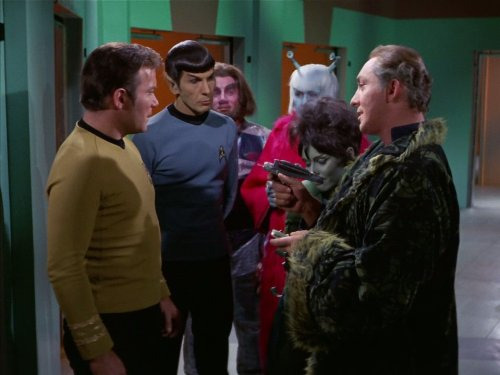
In short, characters can make or break a television show. It is vital that they be likable, or at the very least, interesting, lest the audience utter those eight deadly words:
I Don’t Care What Happens To These People.
Once those words are uttered, it doesn’t matter how gripping your narratives are. The viewers will start to leave.
See, while a film can get away with some lesser characters by distracting with an interesting concept, set-piece or a fast-paced story, television can’t. Thanks to a smaller runtime and a smaller budget, television, by necessity, tends to be character based. As a result, the main cast of a television show has to be able to work in multiple stories of different kinds.
This means that writing for characters on television can be pretty difficult.
The best television characters tend to merge two ideas together: That of relatability and entertainment value.
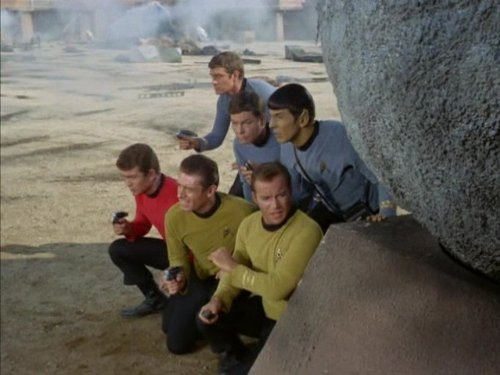
You see, television, like all stories, tells stories of exaggerated versions of reality, especially in the cases of science-fiction adventure shows like Star Trek. The only way to make an audience buy an unbelievable world is to create believable characters to place in that world, that relatability in the stories and characters. When we see McCoy’s frustration, or Kirk’s boldness, or Spock’s reservedness, we see elements of ourselves, our own personalities and lives. It is vital to make characters seem real, if not realistic.
The question is, does Star Trek manage to do that?
That’s the question we’re going to be answering today. Let’s take a look, starting with the Captain of the Enterprise Crew: James Tiberius Kirk.
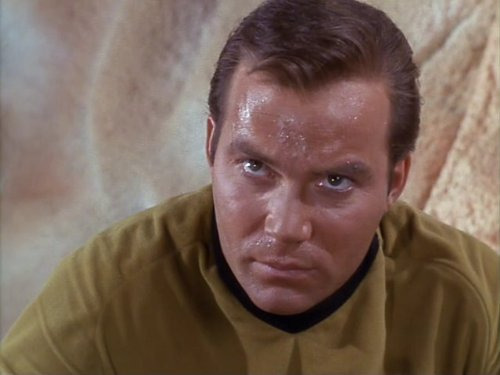
Kirk truly was The Captain in every sense of the word. A Reasonable Authority Figure who did far more adventuring than realistic counterparts would have, Kirk was an Action Man, level-headed, dutiful, and always loyal to his ship and his crew. A Bold Explorer (it’s in the job description), Kirk, while not fearless per say, took the Chains of Commanding quite seriously, and would often face down hugely powerful beings, power-mad computers, or other forces beyond him in order to save his crew. A Determinator to the last, known for his interesting ways to think outside the box and refusal to accept a ‘no win scenario’, he is the unquestionable Hero of the show, the Leader, who often throws the rules aside to do what he feels is right, in a constant battle To Be Lawful or Good. He was a Charmer, an expert fast-talker, and very smart. In later installations of the franchise, Kirk would become a Living Legend, much as he became in our own pop culture.
All that being said, the common cultural image of Captain Kirk isn’t quite right. Allow me to adjust it, as best I can.
More than any other character in Star Trek, or perhaps the history of television in general, Captain Kirk is possibly the most misrepresented character of all time. Since the ‘60s, Kirk has evolved into an icon of heroism, machismo, and brash boldness, with even the recent Star Trek reboot depicting, not Kirk, but rather, the distorted, separate idea of Kirk in the modern light.
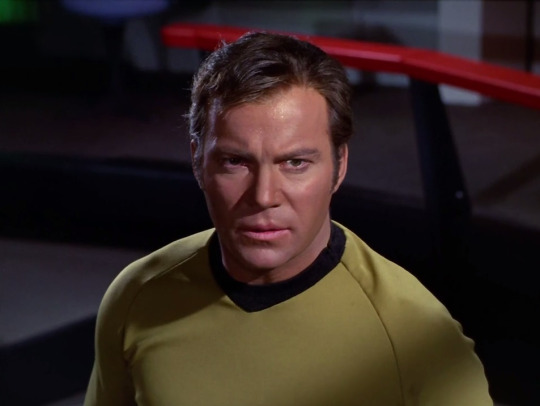
This idea, quite frankly, is just not right. While Kirk did have his share of romances, he was no womanizer, often entering into dubiously consented-to relationships reluctantly, in order to save the ship. The relationships he did actively pursue, he threw himself into wholeheartedly, and he was just as crushed as the other party every time they fell apart (for proof, watch City on the Edge of Forever or The Paradise Syndrome). Kirk was no player. As a matter of fact, he was a deeply compassionate man who respected the women in his life as much as he respected Spock and McCoy. It just so happened that the women in his life tended to not stick around, unlike his one true love: The Enterprise.
Even his reputation of the ‘Cowboy Captain’ isn’t accurate. As I mentioned before, Kirk was defined by compassion. His moments of ‘rule-breaking’ wasn’t to impose ‘the way he thinks things should be’, it’s because Kirk cannot bear to watch helpless people in trouble. The few times where he does break the famous ‘Prime Directive’ (To not interfere with less developed races) is to help. Kirk was a deeply moral character, determined to not stand by while people were taken advantage of. He wasn’t rash, either. While it may be accurate to say that the ship’s doctor, Leonard McCoy, was a bit on the hot-headed side, it is entirely inaccurate to accuse Kirk of the same. Kirk was an extremely smart man, a level-headed captain who was an expert at thinking fast. He trusted his instincts, but he trusted his advisors too, often finding a balance between McCoy’s impulsiveness and Spock’s cold rationality. Kirk’s intelligence and competence is often lost, overshadowed by his more extreme companions, and some audiences have forgotten the truth of Kirk’s character: a cunning problem-solver capable of saving the day under enormous pressure, whose decisions are far from based in irrationality. He is a romantic, duty-bound to protect his ship and crew, greatly exaggerated and mis-characterized in the years following his captaincy.
As such, Kirk was a well-rounded, balanced character, far more three-dimensional than the modern idea of him tends to give him credit for.
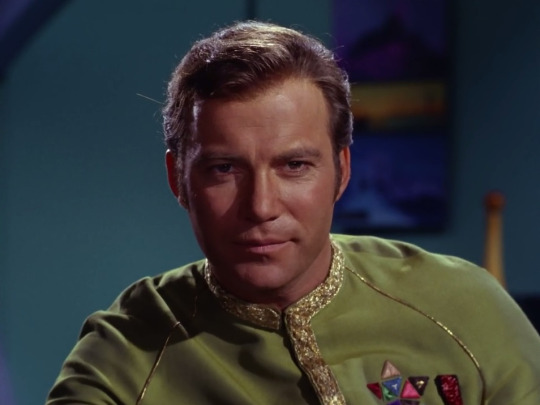
That’s all well and good, sure, but how does he fit as a main character in a television show?
As a matter of fact, absolutely incredibly.
Kirk serves as a wonderfully effective lead, compelling, entertaining, and interesting. Infinitely more developed than most leads of his time, and even more modern examples, Kirk was a game-changer, a revolutionary kind of protagonist who just worked. The perfect balance of the main trio of the series, Kirk is the perfect face for Roddenberry’s ideals: a hopeful pragmatist, an idealist who proves the best of humanity: compassion mixed with intelligence, boldness combined with understanding. A man of action surrounded by True Companions, Kirk was an extremely gripping protagonist who felt intensely, a perfect person for the audience to connect to and be invested in. He drove the stories, opposed the villains, and always saved the crew, as a hero should, but it’s important to note that Kirk was hugely human, possessing many of our greatest attributes, but some of our failings as well. He wasn’t perfect. Sometimes he made the wrong choice. In the end, though, he was us, or us as we should strive to be: always learning and helping, and always reaching for the stars.
But of course, Kirk wasn’t alone in his position as the ‘lead’ of the show. It’s doubtful the show would have survived in the popular culture as well as it did if it weren’t for his support team, his True Companions: Dr. Leonard McCoy, and, more famously: Mr. Spock.
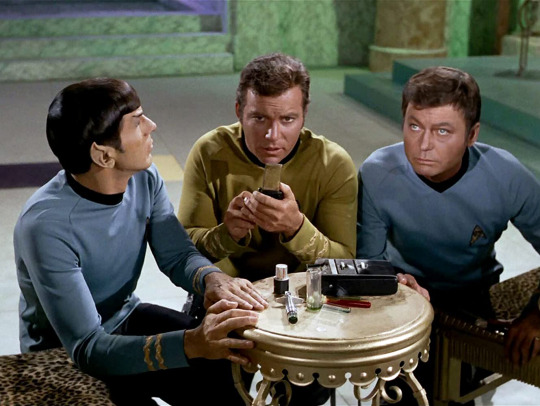
If Kirk represented the best of humanity, Spock represented the critique of it. In a previous article, I pointed out that Spock exists as a very unique character: a half alien, half human crewmember who, while equally valuable to the script and the characters as Kirk was, served a different purpose: to point out and explore humanity from the outside.
Like I’ve mentioned before, Spock is a different sort of character than Kirk is. Where Kirk is a demonstration of the best of humanity as we see it, Spock is a demonstration of humanity as someone else might. He served as a criticism of the human condition, a character at war with himself and his heritage, split between the emotional humans, and the rational Vulcans. Spock is the Number One, almost Comically Serious as he eschews his more illogical half and chooses to embrace the stoicism of the Vulcan people. A Gentleman and a Scholar, Spock has Hidden Depths, a heart of gold and deep emotions that he usually succeeds in hiding.
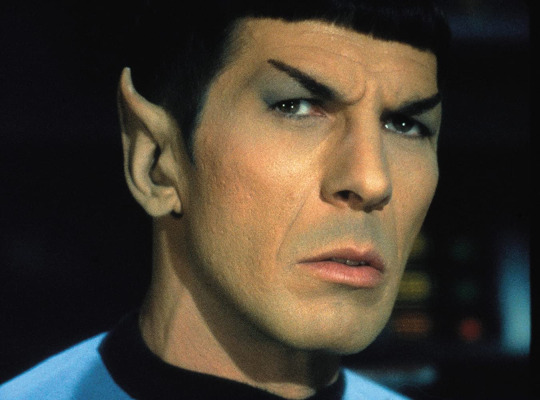
Most of the time. More on that in a minute.
Spock’s role in the show was The Smart Guy, the Stoic who had all the answers, all the statistics. He was the champion of impartial logic, of cold rationality. His job was to give Kirk the hard answers, to bring to him the facts and give him their options, especially the unforgiving ones. He is the cold to McCoy’s hot, a stern-faced, cold-blooded computer.
Or is he?
Much like Kirk, there is a lot more to Spock than meets the eye. While the cultural perception of Spock has often mutated into a parody of itself, much as it has done to Kirk’s reputation, Spock remains a much deeper character than he, or a brief skim of the series, lets on. As I said earlier, Spock is at war with himself, uncomfortable in his own skin. He insults humans for their humanity, but has strong, deep friendships with them. He is not above expressing frustration and their emotional natures when pushed (usually by other forces that knock his guard down), but isn’t frustration a human emotion?
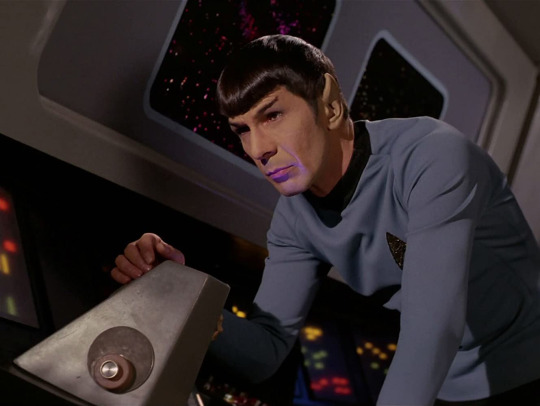
Spock is a bag of contradictions, a supposedly emotionless master of sarcasm, a man without feeling who invites his close friends (emotional humans) to a private Vulcan ceremony, a cold-blooded creature with undying loyalty who occasionally makes ‘illogical’ decisions that would make Kirk proud. A lover of music and a sympathizer to space hippies (Not one of Star Trek’s better episodes, admittedly), Spock was an outsider who fit neither fully as a Vulcan or Human, a person who was struggling to find his place in the universe.
At first, this seems incongruous with the ice-cold exterior he projects, however, rather than being an example of inconsistent writing, it’s a shining example of development and nuance.
You see, Spock never gives up his following of logic. He just begins to approach it differently.
Spock’s style changes slightly as Star Trek progresses (most notably in the films, released ten years after the show’s final season), from cold, ‘computer’ logic to something else: human logic.
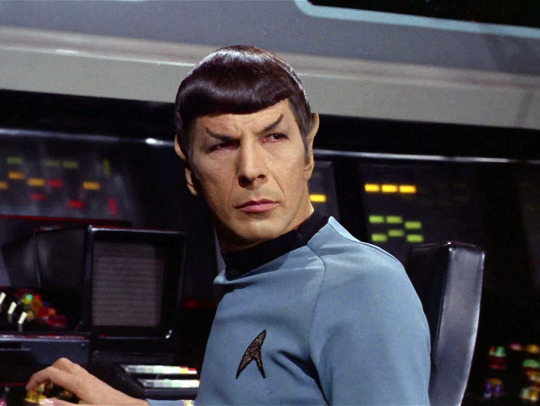
One thing of especial note in the original Star Trek show is that you could see characters visibly affecting one another. Kirk, Spock and McCoy all influenced each other in the ways they thought, reacted, and planned, and worked best as a unit. In this, the humanity of the main cast affected Spock in his slow, reluctant appreciation of human merits. In time, Spock began to make one or two decisions based on human logic, intelligence and emotion. In episodes like The Menagerie or The Galileo Seven, Spock makes decisions that seem out-of-character for him, based in emotion.
Spock is, in many ways, Star Trek’s best known and favorite character. The most visibly recognizable, as well as the most distinct, Spock is given more episodes exploring him than any other character, with installments like Amok Time and Journey to Babel, (the latter of which we explore his parents, and discover why it is that Spock has such a hard time with his human half) helping to examine Spock as a character.
The end result was a beloved science fiction icon, Kirk’s right hand man, an analytical, fascinating character as well-crafted and loved as Kirk himself.
Spock and Kirk are often remembered fondly, and are typically considered the most memorable and iconic characters of the franchise, but they don’t work alone. Their dynamic is as effective as it is because of balance. Spock is one extreme, and Kirk is the middle, but it’s no good without the other extreme: Dr. Leonard Horatio “Bones” McCoy.
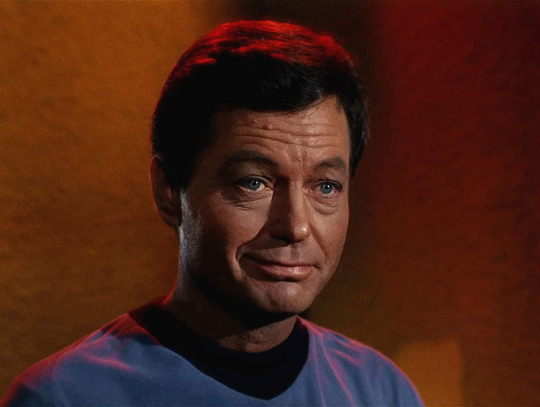
McCoy is all hot-blooded human, the third of the main Power Trio. An old-fashioned competent doctor who wasn’t entirely thrilled with deep space, McCoy is a deeply emotional character, duty-bound to follow his morals. He clashed with Spock regularly, routinely criticizing him for his perceived lack of emotion. Despite the fighting, McCoy respected Spock greatly, counting him as a close friend, despite their arguments and different perspectives. A cantankerous pacifist (though not above getting into the action when needed), McCoy is a Super Doc and a Sarcastic Devotee, a Grumpy Old Man who serves as the Heart to Spock’s Brain (hah!), a man who values Honor Before Reason who values the Good Old Ways. He’s a Determined Doctor who does everything he can for his patients, and a Deadpan Snarker to the point where he can match Spock in verbal sparring.
Bones represents the unpolished rawness of humanity, getting carried away with his emotions sometimes, but always with the best intentions. Another Jerk with a Heart of Gold, McCoy’s gruff nature accompanied a deeply moral man, very concerned with human empathy and doing the right thing. No philosophical discussion was complete without McCoy’s two cents, telling Kirk what he thought the right thing to do was. He was the quintessential Knight in Sour Armor, who would follow Kirk to the ends of the earth, complaining the entire way.
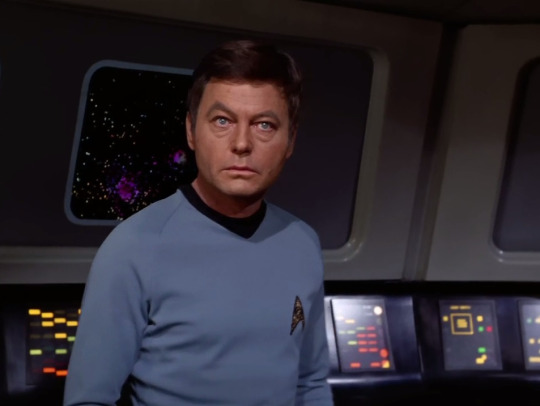
Despite the fact that he’s not as well-known as the other two members of the Power Trio, Bones was a vital component to the True Companions dynamic. His Vitriolic Best Buds relationship with Spock made up one of the most interesting and compelling dynamics on the show, serving as perfect counterbalances to one another. However, although his most famous role in the show was arguing with Spock (and delivering phrases such as ‘He’s Dead, Jim’), there is another, equally important position that he held in the trio.
McCoy served as a foil to Kirk, as well as one to Spock, a confidante, a close friend, providing perspective. While Spock was focused on the logic, Kirk on the best thing for the mission, McCoy’s focus was purely on the ‘patients’, the people, the right thing to do. No matter the situation, McCoy was the closest to empathy with the people involved, and provided the audience with another surrogate, saying the things that the viewers are thinking.
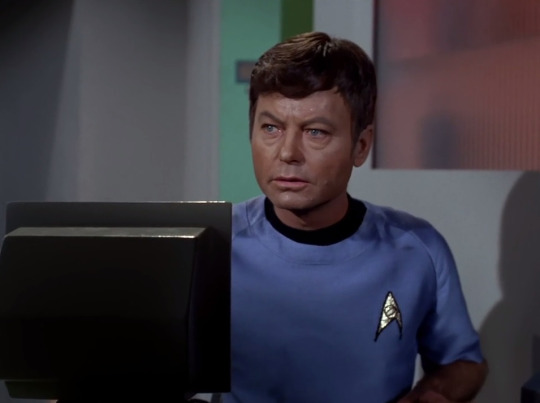
While not being a terribly big fan of space (and liking transporters even less), Bones was the epitome of the Frontier Doctor to the stars, taking care of every patient, even if they weren’t humanoid (Devil in the Dark) or a heavily pregnant woman who refuses to listen (Friday’s Child). McCoy was painfully human, reminding us of our most problematic traits while also holding onto that wild, fiery compassion that made him so incredibly humane, relatable, and understandable, making him just as vital to the Enterprise and her crew as Kirk or Spock.
The trio worked best together, providing a perfect main cast for an audience to follow. The formula was an interesting one, allowing the audience to hear separate viewpoints and ideas, listen in to the philosophical banter, and truly feel the strong friendship holding the leads together. The dynamic between them was powerful, an extremely vibrant bond that connected all three very different characters.
The result? Extremely dynamic characters that remain iconic and memorable even to this day.
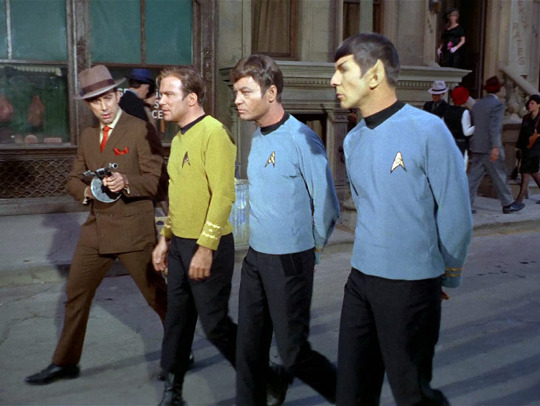
But the cast didn’t stop there.
The other characters of Star Trek, while not quite possessing the pop-culture iconography of the main trio, still hold their own rather impressive cultural footprint.
None more so than the chief engineer, Montgomery Scott.
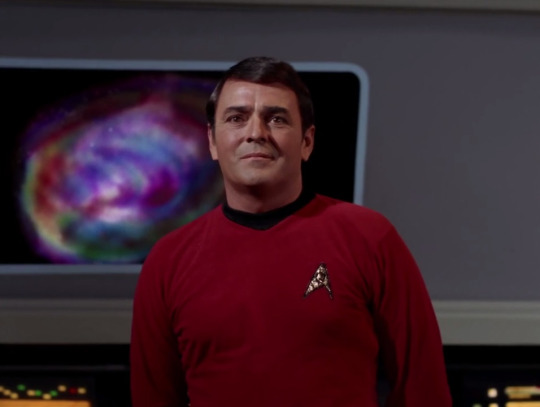
Scotty’s job was to be a miracle worker, solving impossible problems in impossibly small amounts of time. Whether it was the transporters, the phaser banks, the shields, or the engines, Scotty was the man for the job. Nobody had a better understanding, or love for the Enterprise than Scotty (except maybe Kirk). He was the king of outside-the-box solutions, and had the Enterprise jury-rigged to push her past her limits more times than can be easily counted. As the name implies, he was also Scottish, and extremely stereotypically so. Kilt, whiskey, haggis and all, Scotty was extremely proud of his heritage (though not quite as much as Chekov). Fitting the traditional stereotypes, Scotty had a fiery temper, with a Berserk Button triggered by any insult to the Enterprise. A Gadgeteer Genius (and the inventor of Scotty Time) as well as a Genius Bruiser, Scotty was both the brains and brawn, more than capable of holding his own in a fight, or thinking of a new, creative way to push the Enterprise past her capacity.
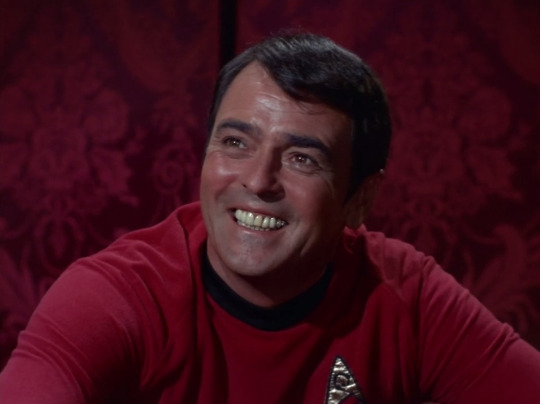
Scotty also held the distinction of being third in command, routinely taking the Captain’s chair when both Kirk and Spock were in the landing party. He was also the focus of a few episodes, making him a rare character with a Day in the Limelight, with episodes such as Wolf in the Fold, The Lights of Zetar, By Any Other Name, and The Trouble with Tribbles giving him a little more screen time and story than is typical. Scotty was an indispensable member of the crew, a life-saver on more than one occasion, and another of the legendary, iconic characters of the original Star Trek.
But it didn’t stop there.
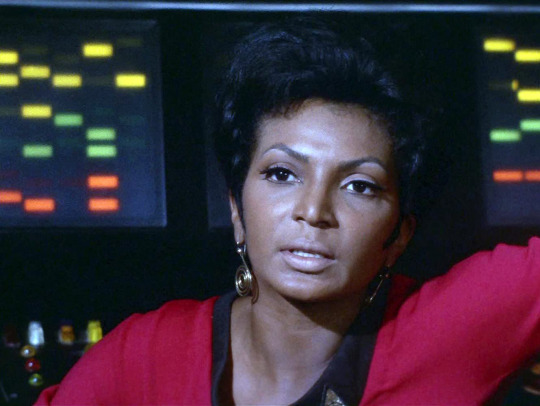
Lieutenant Nyota Uhura was another prominent character. As the ship’s communications officer, she codified the term ‘Bridge Bunny’, although she proved herself far more useful than she’s typically thought of. Whenever given the chance, Uhura is a capable Action Girl, intelligent, witty, and good at her job, being extremely fluent in multiple languages. She too got her days in the limelight, with episodes such as Mirror Mirror, The Gamesters of Triskelion, and The Trouble with Tribbles giving her more to do than just sit at her station and say ‘hailing frequencies open’. Uhura was Silk Hiding Steel, not typically in the heat of the battle, but tough as nails when she had to be. (I’ve talked about Uhura’s extensive influence on the real world in the Legacy article, but even that doesn’t scratch the surface of what Uhura’s impact has been.)
There were others on the bridge crew of equal importance, including the ship’s helmsman, Hikaru Sulu.
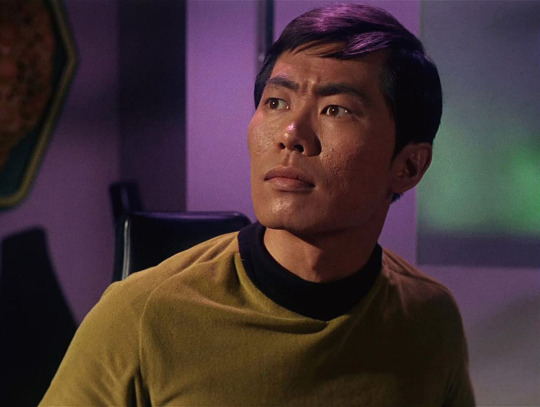
Sulu was a level-headed officer, amiable and cultured, with an extensive knowledge of botany, fencing, and antiques. Yet another Deadpan Snarker (it must run in the cast), Sulu is another Genius Bruiser, as skilled in fighting as he is in his piloting, with a great sense of humor. He is given special attention in episodes like Mirror Mirror and The Naked Time (Albeit as evil, and Brainwashed and Crazy), but often got great character moments in multiple episodes (especially Shore Leave). A reliable officer and loyal to the core, he made an interesting character by himself, although he did end up forming a fun ‘Those Two Guys’ dynamic with the youngest of the cast, Pavel Chekov.
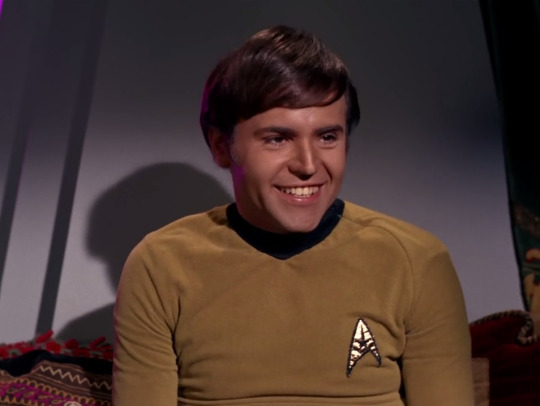
Chekov was introduced in season 2 as the navigator of the Enterprise. A bright young man with a fierce, passionate loyalty to Mother Russia (which evidently invented every good thing known to man), Chekov tended to be at the receiving end of a lot of the embarrassing agony in the series (mostly because Walter Koenig had a great scream). Also serving as a relief science officer, Chekov was plenty smart, if a bit of a Cloudcuckoolander, and the king of Cultural Posturing. Reckless and impulsive to balance Sulu’s calm good humor, Chekov’s temper tended to get the better of him. Like the others, he’s given a bit more screen time in episodes such as Mirror Mirror, The Trouble with Tribbles, The Way to Eden, The Deadly Years and Spectre of the Gun, but got to shine in plenty of other episodes, demonstrating his capabilities (despite being ‘The Intern’ and the Plucky Comic Relief) as a competent officer. Unsurprisingly, he was yet another Deadpan Snarker, lending his style of jokes well to bounce off of Sulu’s drier humor.
But there was more to the crew than the bridge.
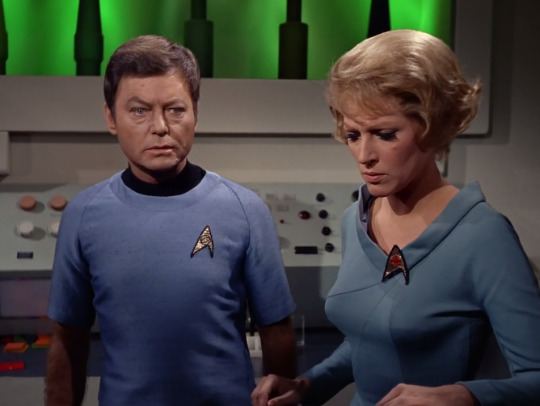
Another crew member of note was Christine Chapel, one of the nurses who operated in the sickbay. Chapel was notable for having an attraction to Spock, as well as being another in the long line of Enterprise Deadpan Snarkers. One of the most caring of the Enterprise’s crew, Chapel was given larger roles in episodes like The Naked Time, What Are Little Girls Made Of?, Amok Time, and Plato’s Stepchildren.
Arguably though, one of the most important characters in all of Star Trek was the Companion Cube: the Enterprise herself.
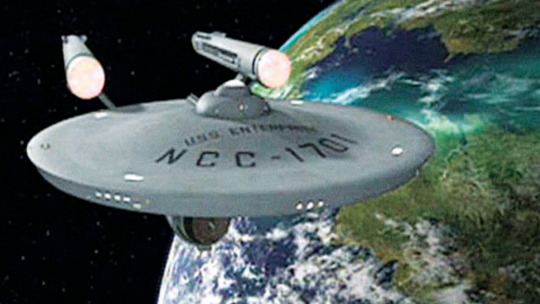
The Enterprise was one of the most powerful ships in Starfleet, a character in her own right. The epitome of the Cool Starship, the Enterprise was well known for Explosive Overclocking, and always coming through in the end (with a little help from Scotty). A Lightning Bruiser of a ship, the Enterprise became as legendary as her captain and crew, as beloved as the characters themselves to the point where one of NASA’s shuttles was named after her.
The characters of Star Trek are legends, both in and out of universe, and they are for a reason. No member of the crew is useless. Everyone has a purpose and a job to do, and each was distinct and unique. No two characters were the same, and each brought their own special personality and abilities to each episode they appeared in.
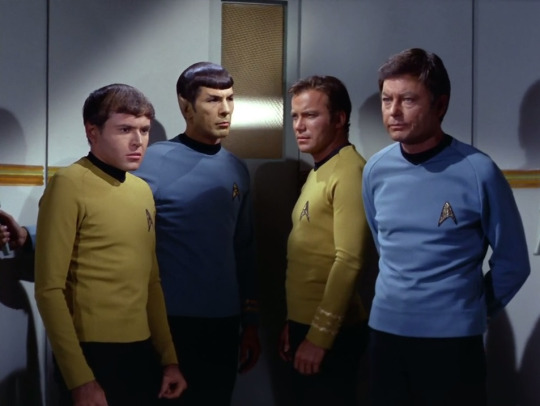
And that’s what made the drama of the show work so well.
Each character felt real, memorable and genuine. We as an audience worry for them with each danger, and cheer with each victory. We liked these people. We cared about what happened to them.
And they worked.
In each scenario and situation, the characters found new and interesting ways to deal with the circumstances, while never losing the core elements of their personalities. That’s important, hugely so. These characters were loved, and still are, for a reason. They work very well as characters, both in main and supporting roles, providing entertaining and compelling figures for the audience to invest in. The balance between relatability and entertainment was hit perfectly for every single character, allowing everyone to shine in their own ways in each episode. They felt real, and in the end, that’s the point of a character.
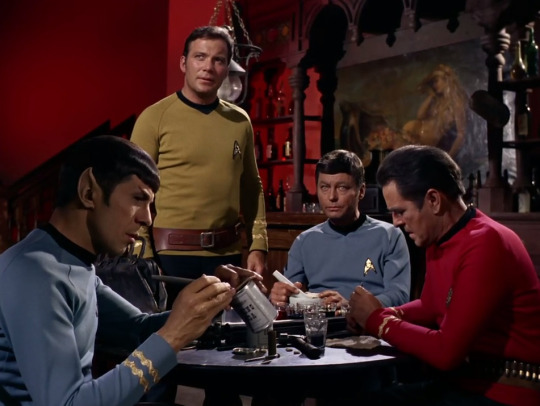
After all, one doesn’t get to be some of the most iconic television characters of all time by being boring.
Thank you guys so much for reading! Join us next time as we discuss Star Trek’s place in the times and the culture. If you have anything you’d like to say, don’t forget to leave an ask! I hope to see you all in the next article.
#Star Trek: The Original Series#Star Trek#TV#Television#TV-PG#60s#Drama#Action#Adventure#Sci-Fi#Science Fiction#William Shatner#Leonard Nimoy#DeForest Kelley#James Doohan#Nichelle Nichols#George Takei#Walter Koenig#Majel Barrett#Gene Roddenberry
133 notes
·
View notes
Note
We all know that the Gothel twist was terrible and was only there for the sake of having a twist, but if it absolutely have been done, how should it had happened to make it better narratively?
so. i spent a lot of time kind of mulling over and autopsying s3 and my personal conclusion about what went wrong is that tts hamstrung itself with poor narrative structure. and this is going to be one of those posts where i lead with definitions of the terminology i’m going to use, for the sake of clarity and to avoid any misunderstanding.
to whit:
story is the sum total of every element of a narrative: character, plot, setting, theme, and structure.
character is, of course, the people in the story. it’s “who?”
plot is the events that happen in a story. it’s “what?”
setting is the time and place of the story. it’s “where?” and “when?”
theme is what the story is *about.* it’s “why?”
and then there’s narrative structure, which i think is a little harder to grasp because it’s much more invisible than the other things. but it’s the framework of the story, or the scaffolding. it’s “how?” — how are the characters rendered? how is the setting created? how are the events of the plot strung together along the throughline? how is the story built?
now… in my opinion, character is the single most important element of a story; compelling characters can salvage an otherwise mediocre story, and nothing kills a story faster than uninteresting characters.
but the one thing good characters can’t ultimately compensate for is poor structure. if the construction is shoddy, so to speak, sooner or later, the roof is gonna leak. right? and we can see this happen in tts: s1 and s2 are solid, and then bam! we hit s3 and it’s a mess of bizarre pacing and dropped characters, the feelings and motivations of key players get all wonky, the plot loses focus, and things increasingly feel like they’re happening by authorial fiat. the weak structure of the narrative has failed, and it dragged the entire story down with it.
and we can look back in retrospect and see that, yeah, all of these problems existed before; tts always had odd pacing, always had an issue with maintenance of the supporting cast, always relied more on convenience than a narrative really should. but these things didn’t hit a critical mass until s3.
so what does this have to do with gothel? well,
in and of itself, “gothel is cassandra’s mother!” is not a terrible plot twist. the problem with it is a problem of execution, which is to say, the flaw is in the structure, not the plot.
#1: set-up
plot twists are kind of difficult to pull off well, because you don’t want to blindside people, but you also don’t want to tip your hand too soon. you want to surprise, or maybe even shock—but you don’t want your audience to go, “wait, WHAT? that makes no sense!”
do you remember the whole “ricky’s quest” thing that went on in s2? we were told that there was an important piece of foreshadowing somewhere in s1 or s2 that no one had picked up on yet and there was this whole thing of people trying to figure out what it was, and then… rapunzel’s return aired, and ricky revealed that the answer was “cassandra briefly glances into the shattered mirror in rapunzel’s tower.”
and that, + the fact that we know cass is adopted and doesn’t remember her birth parents, + vague visual similarities, is the entirety of the s1-s2 foreshadowing for cassandra being gothel’s daughter.
which isn’t nothing, i’ll grant you, but for something as major as the gothel twist, for something that profoundly changes the worldview and motivations of one of the main characters to such a degree that she completely changes sides because of it, it might as well be nothing.
gothel is afforded zero narrative importance in s1-s2. rapunzel has one nightmare about her, and some lingering trauma connected to the tower that is explored, and of course tromus briefly uses her image to try to control rapunzel in rapunzeltopia. but gothel herself is a non-entity until she abruptly and without warning becomes the emotional lynchpin of the entire conflict in s3. that’s jarring.
cassandra is a complex character whose apparent motivations for turning against rapunzel are meticulously built up over the course of s2… only for s3 to pull a bait-and-switch, sweep all of that set-up under the rug, and replace it with cassandra’s messed up feelings about gothel’s abandonment. even her ruined hand never gets mentioned again—not by her, not by zhan tiri, not by rapunzel, not by anyone. that’s jarring, too.
to use my own work as a point of comparison here, the bitter snow equivalent of the gothel reveal is cassandra finding out that sirin is her aunt and her parents were innocent. like the gothel twist, learning that information profoundly changes how cassandra sees herself and the world, and it’s intended to be a big shock… but unlike the gothel twist, i did a lot of setting up for it:
1: sirin has real narrative importance in the first half of the story, pre-reveal. the fic opens with her, her involvement with the separatists is established early, etc.
2: pieces of cassandra’s backstory are threaded through the first half of the story. by the time we hit the reveal, it’s been established that cass is saporian, that her parents were executed for treason, that this treason involved selling poisoned crops and causing outbreaks of a deadly sickness.
3: there are many demonstrations of anti-saporian discrimination and prejudice in the first half of the story: the way cass sees herself and the alienation she feels from the rest of corona, past incidents where she was targeted for being saporian, basically every time gilbert opens his mouth, what happened to caine’s dad.
4: cassandra discovers evidence of the harsh, unjust nature of the crackdown and realizes that at least some of what she’s been taught about coronan law enforcement and recent history is inaccurate… thus planting the seed, for the readers if not for cass herself, that other things might be false too.
5: caine points out that cass is the reason the separatists don’t let parents join up, and though she doesn’t elaborate on that, it’s because cass is proof that corona will steal saporian children if their parents are accused of treason.
and 6: everything sirin says to cass in chapter 14 is wrapped up in her being painfully, painfully aware that a) cass is her niece and b) probably doesn’t know the whole story—while also trying to stick to the plan. so… while she doesn’t spill the beans there, she knows who cass is, she stops andrew from hurting her, she makes a point of not acknowledging the legitimacy of cassandra’s adoption, and obliquely suggests that sir peter is a murderer… and while she tries to stop cass from interfering with what they’re doing, she doesn’t hurt her, even though she very much could.
so… in chapter 15, when sirin comes out with “actually, the blight was a natural disaster no one anticipated and saporians got sick and died too, your parents were just scapegoats because corona wanted someone to blame, and oh, by the way, you’re my niece,” it’s a shock but not one that comes entirely out of left field. cassandra’s parents being innocent victims of an overzealous and prejudiced justice system is a logical extension of all the stuff that has already been set up, and sirin being cass’s aunt helps to clarify motivations that were previously opaque (such as: why does sirin despise corona so much, why didn’t she just kill cass, etc).
and because all of this stuff is given so much attention in the first half of the story, the way it snaps cassandra’s worldview in half and causes such a massive reorienting of her goals and loyalties feels natural. because it already mattered a great deal to her, and it related to the doubts she was already experiencing.
which like, that’s the key. setting up a big plot twist isn’t about establishing one basic fact (“cass is adopted”) and tossing in one instance of symbolic foreshadowing (the mirror thing) and nothing else, over the course of two whole seasons of a tv show. it is about priming the audience to be ready to accept the reveal.
how could tts have done this with the gothel reveal? here’s some ideas:
1: give gothel a greater presence in the narrative. the simplest way to do this would be to really lean in to how fucked up rapunzel is because of her. more nightmares, more overt moments where we see rapunzel still being haunted by her memory. alternatively, lean more into the fact that gothel was a disciple of zhan tiri.
2: give cassandra’s adoption, and the question of her birth parents, even a teeny tiny glimmer of interest. specifically, let “dad found me after my parents abandoned me” be the only thing cass knows about her adoption, and let that hurt her. she doesn’t even have to be curious about who her birth parents were—just have that pain of abandonment more present in the first two seasons.
3: imply the captain knows more about cassandra’s origins than he lets on.
4: you know the parallel in RATGT where rapunzel screams at cass the way gothel screamed at rapunzel? more of that. like, how delicious would it be if there were many little instances in s1-s2 of rapunzel lashing out at cass with behaviors she obviously subconsciously learned from gothel, only for s3 to pull the sucker punch of cassandra being gothel’s daughter? like! imagine how that could so EASILY make cassandra recontextualize her entire relationship with rapunzel by linking rapunzel’s toxic behaviors with gothel’s abuse and abandonment in her mind? and then in s3 you can really dig into rapunzel interrogating her own behaviors and struggling to break the cycle of abuse.
5: if gothel being a former disciple of zhan tiri is narratively important, it can go hand-in-hand with zhan tiri and the other disciples more overtly targeting cass, specifically. even if we don’t know why until the reveal.
i’ve seen a couple posts from other folks discussing how to “fix” the gothel twist, and many of them involve cass either knowing from the start or finding out much earlier, but while that could work, i don’t think it’s necessary. it’s all about the set up. it’s all about constructing the story in such a way that the audience goes “OH!” instead of “WHAT?!” when the reveal happens, and the specific timing of the reveal doesn’t really… matter.
#2: execution
surprising absolutely no one, i’m going to talk about zhan tiri now.
based on what chris has said in various interviews, my understanding is this: originally, cass was originally supposed to be a secret antagonist all along and know about her parentage right out of the gate. her characterization softened early on in the process, her knowing about gothel got dropped, and suddenly the creators needed a way for her to learn that gothel was her mom, and thus zhan tiri entered the narrative.
she is a plot device whose whole purpose is to tell cass “gothel was your mom and abandoned you for rapunzel,” and then fuel her downward spiral. the rest of her character exists in service of that, full stop.
which… like the gothel reveal, having a character whose primary function is to be a plot device isn’t a problem in and of itself. however. “ancient evil demonic sorceress with deep ties to the magical lore of the setting and an entrenched hatred for team hero, whose MO is manipulating people” is a terrible character archetype to use as this kind of plot device, because that kind of character needs to have an agenda in order to function, and as soon as you give them an agenda they develop a gravitational pull on the rest of the story, especially if they’re directly involved with a main character.
and if you’re willing to roll with that gravitational pull, it can be fine. but if you’re not… you get tts s3.
chris has pretty much spelled this out in interviews. he said at one point that they debated multiple potential motives for zhan tiri… but found that anything more complex than “wants the drops and to burn corona to the ground, because reasons” sucked oxygen away from the cass vs raps conflict and eventual reconciliation, which… yeah. so they gave zhan tiri the cardboard motives and didn’t really do anything with her other than trotting her out to give cass a good shove in whatever direction the plot needed cass to fall in every so often.
that zhan tiri is a compelling character in s3 at all is a testament to the strength of her VA and the sheer potential of her established lore, in combination with the fact that she and cassandra are off screen enough to demand that the audience fill in a lot of gaps. but in, like, the actual text, she has all the complex personality of a piece of damp tissue paper and she is, for all intents and purposes, literally just Cassandra’s Brain. every decision, every single decision cass makes in s3 is because of zhan tiri. why take the moonstone? zhan tiri tells her to. why is she so mad at rapunzel? zhan tiri made her that way. why does she attack rapunzel? zhan tiri convinced her she had to. why does she go to gothel’s cabin in TOTS? zhan tiri tipped her off that rapunzel would be there. why does her fragile truce with rapunzel fall apart at the end of TOTS? zhan tiri interfered. why does she try to reconcile again in OAH? she found out zhan tiri was… zhan tiri. why does that reconciliation fail? zhan tiri. why does cass ultimately redeem herself? because zhan tiri stabs her in the back first.
*deep breath*
this is what happens when you troubleshoot a broken narrative with plot devices instead of opening it up to fix whatever is wrong with the underlying structure. in this case, cassandra not knowing about gothel from the get go broke her planned villain arc… and the creators applied zhan tiri like a bandaid, molding this new character into someone who could railroad cass down the preexisting plan for her villain arc.
what needed to happen instead was a wholesale reexamination and reconfiguration of cassandra’s villain arc, her reasons for going down that path, and her reasons for coming back. even if finding out the truth about gothel was still the trigger for it, it’s ultimately not about gothel anymore. gothel is just the last straw.
and in order to work with the characters as-established in s1-s2, the events of s3 would need to be framed that way. if, after all the shit she goes through in s2, cass met zhan tiri, learned that gothel was her mom and abandoned her for rapunzel, and finally just snapped and went after the moonstone because fuck this, fuck you, and then zhan tiri came in with the compassion and emotional validation and the “your mother treated you as a servant and then discarded you for something she thought was better, and so did rapunzel, didn’t she? but i see you, i believe in you, i am your friend, and we can help each other,” and cass bought that because she’s desperate for emotional support and kindness and fuck it, she’s on team demon now, only for her conscience to eat away at her until she couldn’t take it anymore and broke away from zhan tiri for good… then it works, full stop.
like, you don’t have to change a single plot event for the gothel twist to work. you just have to string those plot events along an emotional throughline that makes sense and feels connected to what happened in s1-s2. you can’t use zhan tiri to graft the s3 arc of evil-all-along proto-cass onto canon s1-s2 and call it a day because that doesn’t work! you have to write for the characters you have, not their early planning-stages iterations. if you make a decision early on that breaks your original plan, you have to commit to redoing the whole plan.
and if you do that, if you fix the underlying structure, you don’t need a character whose sole purpose is to railroad another character down a predetermined path that no longer fits her characterization; cass and zhan tiri can instead both be characters, acting according to their motivations and goals, and not puppets pantomiming the ghost of a broken plan.
(you do still have to accept that zhan tiri will pull focus away from the cass+rapunzel friendship, though. them’s the breaks. don’t use zhan tiris if you’re not willing to let them gobble up the spotlight a bit.)
TL;DR: to fix the gothel twist, set it up better in s1-s2 by making the question of cassandra’s parentage, or abandonment by her parentage, important to the narrative at all, or else by focusing more closely on gothel being a disciple of zhan tiri; then execute the s3 villain arc in a way that makes sense for canon cass and what she experiences in s1-s2, rather than using zhan tiri to railroad her down the path evil-all-along proto-cass was supposed to take.
the problem is a structural one so at the end of the day the solution is to fix the structure. ¯\_(ツ)_/¯
111 notes
·
View notes
Note
I'm not sure if this question has been asked before, but what would be usually the reason why people would torture someone? Not to justify (torture is unjustifiable in any situation) but I really needed a driving force for a villain why they would w/o sounding ridiculous or implausible, and any reason I come up with falls kind of flat (... Which I suppose is expected, since that's how the reasonings behind tortures are in rl I guess)
I can help you out here. And I want you to know that from a writing stand point this does make perfect sense. Motivation, however shallow, is important for capturing a character.
Yes a lot of the motivations in reality are flat, shallow and outright stupid. And it can be a careful balancing act, showing those motivations making them understandable without straying into justifying them. It can also be hard to make an interesting character with flat motivations.
I think I’ll start off with talking about motivations/‘reasons’ in reality and then talk a little about when and whether we should break from reality when we write about torturers.
Remember that there isn’t a lot of research on torturers. So I’m working from the little bit of research I can access, interviews with torturers and anecdotal reports. It isn’t perfect, but this is (so far as I can tell) the best information we have at the time of writing.
Understanding why torture occurs means understanding that it is structural violence.
I do take questions on abuse, I personally don’t see much point in sticking to the strict legal definition of torture when I’m trying to help authors do a decent job portraying trauma survivors. But sometimes the definition matters. And torture is essentially defined as abuse by government employees*, by public servants in positions of authority.
Over and over again the reasons torturers give for their crimes come back to flaws in the organisations they were part of. Consistently, across cultures and time periods, they describe understaffed, high pressure environments with no training, little supervision and the instruction to produce results or else.
This combines with cultural messages that violence ‘works’ and existing sub-cultures of torturers within organisations to perpetuate abuse.
It’s also worth mentioning that for most torturers they’re coming into an organisation where there are already established sub-groups of torturers. The group dynamics do seem to play a role in all this. Though it’s difficult to say how much when we’re entirely going from what torturers say and they are… demonstrably inaccurate when it comes to talking about torture.
Having said that; torturers do seem to encourage each other to more and more acts of violence. They treat it almost competitively. They will also, sometimes, approach new recruits and bring them into the torturer sub-group, pressuring them to participate.
I’m unsure how much of a role the social factor plays in torturers starting to torture, but it definite seems to keep them torturing when they say they’d rather stop. There are a couple of reasons why.
First of all there’s a sort of implicit threat; refusing to torture is seen as a threat to the torturer sub-culture. And these are people who have already shown a capacity for violence. There have been cases of torturers attacking other members of the same organisation for their opposition to, or refusal to, torture.
There’s also a social aspect; once involved with the torturer sub-culture the individual tends to become more and more cut off from the rest of the organisation. The group of torturers becomes more or less their entire social circle.
We’re social animals. So leaving, rejecting the entire social group, is a big deal. It’s hard for us to do.
The toxic sub-culture torturers form encourages them to root part of their identity in their capacity for violence and how ‘good at it’ the other members of their group think they are. They tend to tie ideas of toughness, dependability, achievement and (often) masculinity to torture. They frame themselves as especially manly, strong and ‘willing to do the tough jobs no one else has the guts to’.
It’s complete nonsense but it’s what they do.
And it means that facing up to the fact torture is pointless feels like an attack on their self worth. A lot of them choose to double down rather then face that reality.
This isn’t a definitive list of relevant factors. It’s my assessment of the ones that always seem to show up. There are usually other factors that feed into particular situations. Rejali’s Three Systems is a worth a read on that front.
Ideas about social hierarchy and transgression are common features. So things like ‘anyone who does That Terrible Thing deserves to be tortured’ or ‘no one Like That would be in this part of town for an innocent reason’.
All of this means that motivation can be tricky to write, because the real motivations are often not the sort of thing we’re taught are ‘interesting’.
Real, honest motivations are often things like:
‘I think those people deserve it’
‘I was told to’
‘Everyone else was doing it’
‘I couldn’t think of anything else to do’
‘I got angry and took it out on someone else’
‘I thought it would work and no one ever taught me another way’
That’s not a definitive list but you get the idea. And probably get the point about these sorts of shallow motivations being narratively unsatisfying.
So let’s step back from the reality and tackle the writing problem at the heart of this: how do we make this interesting?
There are a couple of different approaches.
The first approach I see is to accept that the motivation and the villain are shallow and shift the interest away from the villain.
Villains don’t need to be interesting. And they don’t need to be the focus.
If your story is structured in a way which primarily makes the villain a looming threat and focuses on the heroes, their journey, their relationships then adding detail or depth to the villain is unnecessary.
The Lord of the Rings trilogy does this with several of its major villains. The Shape of Water does it for the main villain. Zelda: Breath of the Wild (yes I bought a switch during lock down, and it’s my first Zelda game I am not sorry) does it with Ganon.
Another approach is to accept the motivation is shallow and shift the focus away from the villain’s motivation.
Villains do not need to have a grand philosophy or deep motivation or underlying pain in order to be a good read. They don’t need to be an intellectual threat to the heroes in order to be a legitimate threat.
For instance Joker in Batman: The Animated Series, I’d argue one of the best takes on the character ever. But if you go back and watch the episodes he isn’t deep. His motivation almost always boils down to pettiness, greed and a vindictive streak a mile wide. It is incredibly shallow.
But he’s fun to watch, because he’s unpredictable and funny. He’s also a legitimate threat to the heroes because he’s so incredibly destructive. More then any other villain his crimes are aimed at effecting large numbers of people. That sets the stakes high without any motivation or philosophy coming into it.
The focus is on what he does each time he shows up, not why.
Persona 5 pulls off a similar trick. Every single one of its villains has a shallow motivation. But each of them also has power over one of the heroes or another innocent person. They don’t need a deeper or more interesting motivation in order to make life miserable for the heroes. And every caper hinges on the heroes trying to stop that worst outcome.
As much as Fullmetal Alchemist is a deep story which touches on many complex topics, neither version (the original manga or the 2003 anime with it’s very different plot) had a particularly complex villain at the end of the story. In both cases the ultimate leader of the ‘bad guys’ just wanted more power. And didn’t care how many lives they destroyed to get it.
Not all stories need a Killmonger.
It’s always worth taking the time to consider what your story needs, rather then what’s fashionable in fiction at the moment. On a personal note some of my favourite stories have been either entirely focused on the heroes or had explicitly shallow villains.
The reality is that most of the time motivations for large scale atrocities are shallow and unsatisfying. Giving fictional villains deeper or more complex motives can work, but it can also mean twisting the narrative up to make it look like the villain (and hence their actions) are more reasonable then they are.
Killmonger’s twisted vision of what would make Wakanda ‘better’ works in Black Panther, just as White Wolf’s similar motivation did in the comics a decade or so earlier. They work because they’re directly competing with the hero’s vision of what would make the world better. And because ultimately it’s about showing why T’Challa’s way is better then the villain he’s facing off against.
But I can think of other stories where giving the villain a ‘deeper’ reasoning just served to make them look reasonable. While they were arguing for torture and genocide.
And… I just think we’ve got enough of that in real life.
At the end of the day your villain should be serving a role within the story you’re creating. Motivation is one of many ways that we try to make sure they serve that function effectively and entertainingly.
But, despite what some people would have you believe, it ain’t the be all and end all of whether a villain or story is entertaining. Personality, plots, aesthetic and sometimes how satisfying it feels to see their day ruined, all feed in to how well a villain works.
The threat they represent in the story isn’t dependant on whether their motivation is deep or nuanced or rational. It’s about their ability to follow through and sometimes the horrific nature of the desire itself.
So I guess a lot of my advice here is to consider what your villain actually needs to do in the story. Then take a step back and consider whether deeper motivation adds anything to that.
Be aware that the more complex motivations and drives you add the further you’re getting from a realistic torturer. Which is not inherently apologia, or inherently a bad writing idea, but consider what any deviation from reality implies.
I hope that helps. :)
Available on Wordpress.
Disclaimer
*The international definition can include groups that control territory, ie an occupying force. In some countries the definition is slightly wider and encompasses some international criminal gangs.
#writing advice#tw torture#writing torturers#behaviour of torturers#motivations of torturers#threatening villains#motivation#writing villains#effects of torture on organisations#defining torture
78 notes
·
View notes
Note
Would love to hear about your beefs with Lucas because I have beefs with Lucas
(Sorry it took me three thousand years to answer this, anon.)
They mainly fall under a few headings, with the third being the most serious and the thing that I am genuinely irl furious about at least biannually (and feeling unable to adequately sum up The Problem with it after yelling about it so often is a huge part of why this post has been in my drafts for such a long time):
1. His self-mythologising and the subsequent uncritical repetition of his bullshit in the fandom. Obvious lies like that he had some master plan for 10 films when it’s clear he did not have anything like a plot outline at any point. We all know the thing was written at the seat of various people’s pants, it’s blatantly self-evident that’s the case. There’s also plenty of public record about how the OT was written. Even dumber, more obvious lies, like that Anakin was ‘always the protagonist’ and the entire 6 films were his story from the beginning. This is preposterous and every time someone brings it up (usually with palpable smugness) as fanboys ‘not understanding star wars’ because they don't get that ‘the OT is not Luke's story’... Yeah, I just... I cannot.
Vader wasn’t Anakin Skywalker until ESB, it’s a retcon. It’s a brilliant retcon and it works perfectly, it elevated SW into something timeless and special it otherwise would not have been, but you can tell it wasn’t the original plan and there’s proof it wasn’t the original plan. Let’s not pretend. And Luke is the protagonist. No amount of waffling about such esoteric flights of theory as ‘ring structure’ is going to get away from the rigidly orthodox narrative and the indisputable fact that it is Luke’s hero’s journey. Vader’s redemption isn’t about his character development (he has almost none) and has no basis in any kind of convincing psychological reality for his character, but it doesn’t need to be because it’s part of Luke’s arc, because Vader is entirely a foil in Luke’s story. It’s a coming-of-age myth about confronting and growing beyond the father.
All attempts to de-centre Luke in RotJ just break the OT’s narrative logic. It’s a character-driven story and the character driving is Luke. Trying to read it as Anakin’s victory, the moral culmination of his choices rather than Luke’s and putting all the agency into Anakin’s hands just destroys the trilogy’s coherence and ignores most of its content in favour of appropriating a handful of scenes into an arc existing only in the prequels. The dilemma of RotJ is how Luke will define ethical adulthood after learning and growing through two previous films worth of challenge, education, failure, and triumph; it’s his choice to love his father and throw down his sword which answers the question the entire story has been asking. Vader’s redemption and the restoration of the galaxy are the consequences of that choice which tell us what kind of world we’re in, but the major dramatic conflict was resolved by Luke’s decision not the response to it.
And, just all over, the idea of Lucas as an infallible auteur is inaccurate and annoying to me. Obviously he’s a tremendous creative force and we wouldn’t have sw without him, but he didn’t create it alone or out of whole cloth. The OT was a very collaborative effort and that’s why it’s what it is and the prequels are what they are. Speaking of which.
2. The hubris of the prequels in general and all the damage their many terrible, protected-from-editors choices do to the symbolic fabric of the sw universe. Midicholrians, Yoda fighting with a lightsabre, Obi-wan as Anakin's surrogate father instead of his peer, incoherent and unmotivated character arcs, the laundry list of serious and meaningful continuity errors, the bad storytelling, the bad direction, the bad characterisation, the shallowness of the parallels which undermine the OT’s imagery, the very clumsy and contradictory way the A/P romance was handled, the weird attitude to romance in general, it goeth on. I don’t want to re-litigate the entire PT here and I’m not going to, but they are both bad as films and bad as prequels. The main idea of them, to add Anakin’s pov and create an actual arc for him as well as to flesh out the themes of compassion and redemption, was totally appropriate. The concept works as a narrative unit, there are lots of powerful thematic elements they introduce, they have a lot of cool building blocks, it’s only in execution and detail that they do a bunch of irreparable harm.
But the constant refrain that only ageing fanboys don’t like them and they only don’t like them because of their themes or because they humanise Anakin... can we not. The shoddy film making in the prequels is an objective fact. If you want to overlook the bad parts for the good or prioritise ideas over technique, that’s fine, but don’t sit here and tell me they’re masterworks of cinema there can be no valid reason to criticise. I was the exact right age for them when I saw them, I am fully on board with the fairy tale nature of sw, I am fully on board with humanising Anakin- the prequels just have a lot of very big problems with a) their scripts and b) their direction, especially of dialogue scenes. If Lucas had acknowledged his limitations like he did back in the day instead of believing his own press, he could have again had the help he obviously needed instead of embarrassing himself.
3. Killing and suppressing the original original trilogy. I consider the fact that the actual original films are not currently available in any form, have never been available in an archival format, and have not been presented in acceptable quality since the VHS release a very troubling case study in the problems of corporate-owned art. LF seizing prints of the films whenever they are shown, destroying the in-camera negatives to make the special editions with no plans to restore them, and doing all in the company’s considerable power to suppress the original versions is something I consider an act of cultural vandalism. The OT defined a whole generation of Hollywood. It had a global impact on popular entertainment. ANH is considered so historically significant it was one of the first films added to the US Library of Congress (Lucas refused to provide even them with a print of the theatrical release, so they made their own viewable scan from the 70s copyright submission).
The fact that the films which made that impact cannot be legally accessed by the public is offensive to me. The fact that Lucas has seen fit to dub over or composite out entire performances (deleting certain actors from the films), to dramatically alter the composition of shots chosen by the original directors, to radically change the entire stylistic tone by completely reinventing the films’ colour timing in attempt to make them match the plasticy palate of the prequels, to shoot new scenes for movies he DID NOT DIRECT, add entire sequences or re-edit existing sequences to the point of being unrecognisable etc. etc. is NOT OKAY WITH ME when he insists that his versions be the ONLY ones available.
I’m okay with the Special Editions existing, though I think they’re mostly... not good... but I’m not okay with them replacing the original films. And all people can say is ‘well, they’re his movies’.
Lucas may have clear legal ownership in the capitalistic sense, but in no way does he have clear artistic ownership. Forget the fans, I’m not one of those people who argue the fans are owed something: A film is always a collaborative exercise and almost never can it be said that the end product is the ultimate responsibility and possession of one person. Even the auteur directors aren't the sole creative vision, even a triple threat like Orson Welles still had cinematographers and production designers, etc. Hundreds of artists work on films. Neither a writer nor a director (nor one person who is both) is The Artist behind a film the way a novelist is The Artist behind a novel. And Lucas did NOT write the screenplays for or direct ESB or RotJ. So in what sense does he have a moral right to alter those films from what the people primarily involved in making them deemed the final product? In what sense would he have the right to make a years-later revision the ONLY version even if he WERE the director?
Then you get into the issue of the immeasurable cultural impact those films had in their original form and the imperative to preserve something that is defining to the history of film and the state of the zeitgeist. I don't think there is any ‘fan entitlement’ involved in saying the originals belonged to the world after being part of its consciousness for decades and it is doing violence to the artistic record to try to erase the films which actually occupied that space. It's exactly like trying to replace every copy of It's a Wonderful Life with a colourised version (well, it's worse but still), and that was something Lucas himself railed against. It’s like if Michaelangelo were miraculously resuscitated and he decided to repaint the Sistine Ceiling to add a gunfight and change his style to something contemporary.
I get genuinely very upset at the cold reality that generations of people are watching sw for the first time and it’s the fucking SE-except-worse they’re seeing. And as fewer people keep physical media and the US corporate oligarchy continues to perform censorship and rewrite history on its streaming services unchecked by any kind of public welfare concerns, you’ll see more and more ‘real Mandela effect’ type shit where the cultural record has suddenly ‘always’ been in line with whatever they want it to be just now. And US media continues to infect us all with its insidious ubiquity. I think misrepresenting and censoring the past is an objectively bad thing and we can’t learn from things we pretend never happened, but apparently not many people are worried about handing the keys to our collective experience to Disney and Amazon.
4. The ‘Jedi don’t marry’ thing and how he wanted this to continue with Luke post-RotJ, so it’s obviously not meant to be part of what was wrong with the order in the prequels. I find this... incoherent on a storytelling level. The moral of the anidala story then indeed becomes just plain ‘romantic love is bad and will make you crazy’, rather than the charitable reading of the prequels which I ascribe to, which is that the problem isn’t Anakin’s love for Padmé, it’s that he ceased to love her and began to covet her. And I can’t help but feel this attitude is maybe an expression of GL’s issues with women following his divorce. I don’t remember if there’s evidence to contradict that take, since it’s been some time since I read about this but yeah. ANH absolutely does sow seeds for possible Luke/Leia development and GL was still married while working on that film. Subsequently he was dead set against Luke ever having a relationship and decided Jedi could not marry. Coincidence?
There’s a lot of blinking red ‘issues with women’ warning signs all over Lucas’s work, but the prequels are really... egregious.
#sw#salt#more unhinged rambling#anyway dowload the despecialised editions#unsubscribe from Disney+#be free#usually we'd be having a big family thing for Boxing Day but you know#so God bless us all at home separately#I hope everyone had as happy a Christmas as possible in keeping with the situation#I should see if I can drag my brother outside to build a snowman
42 notes
·
View notes